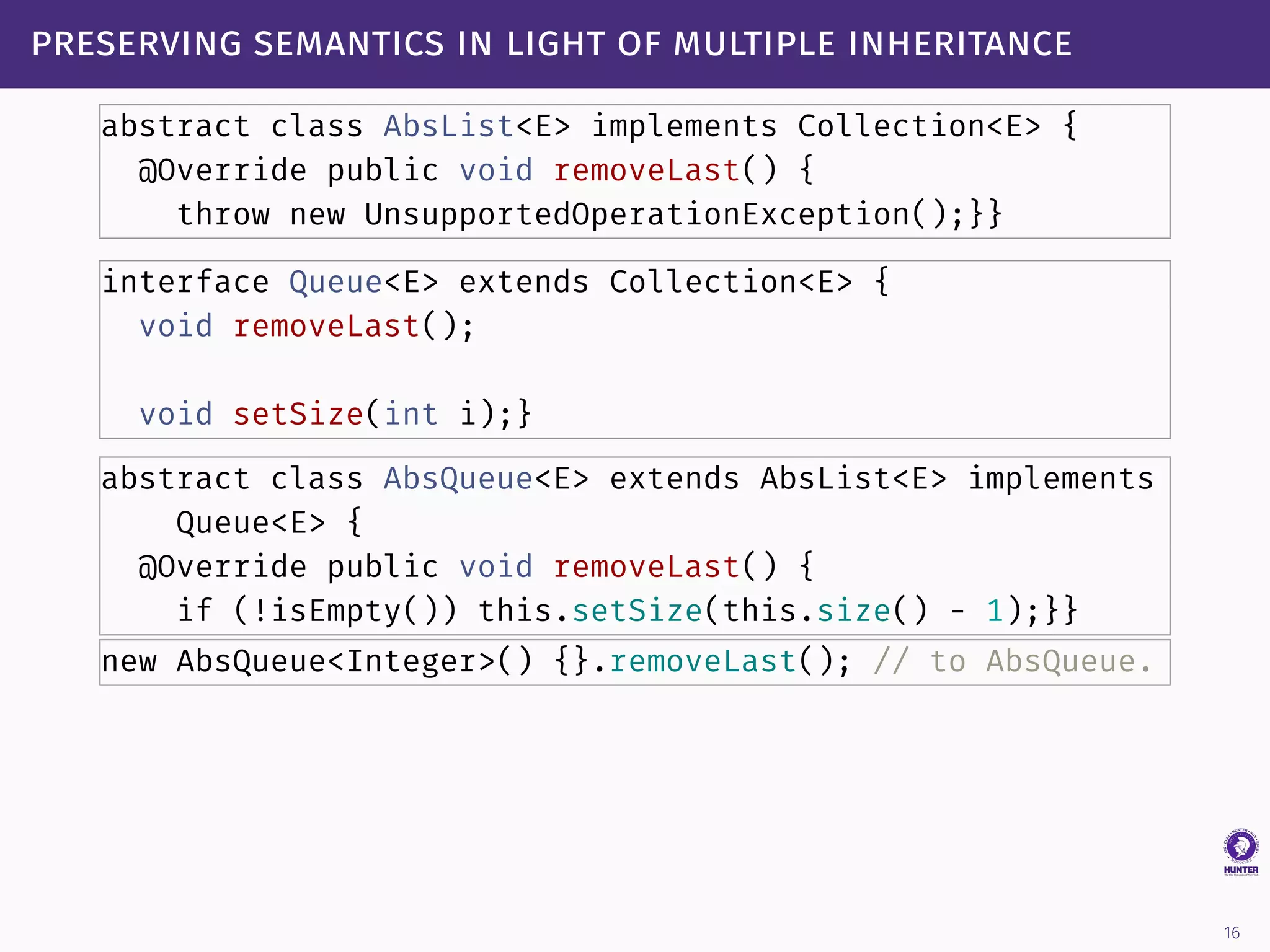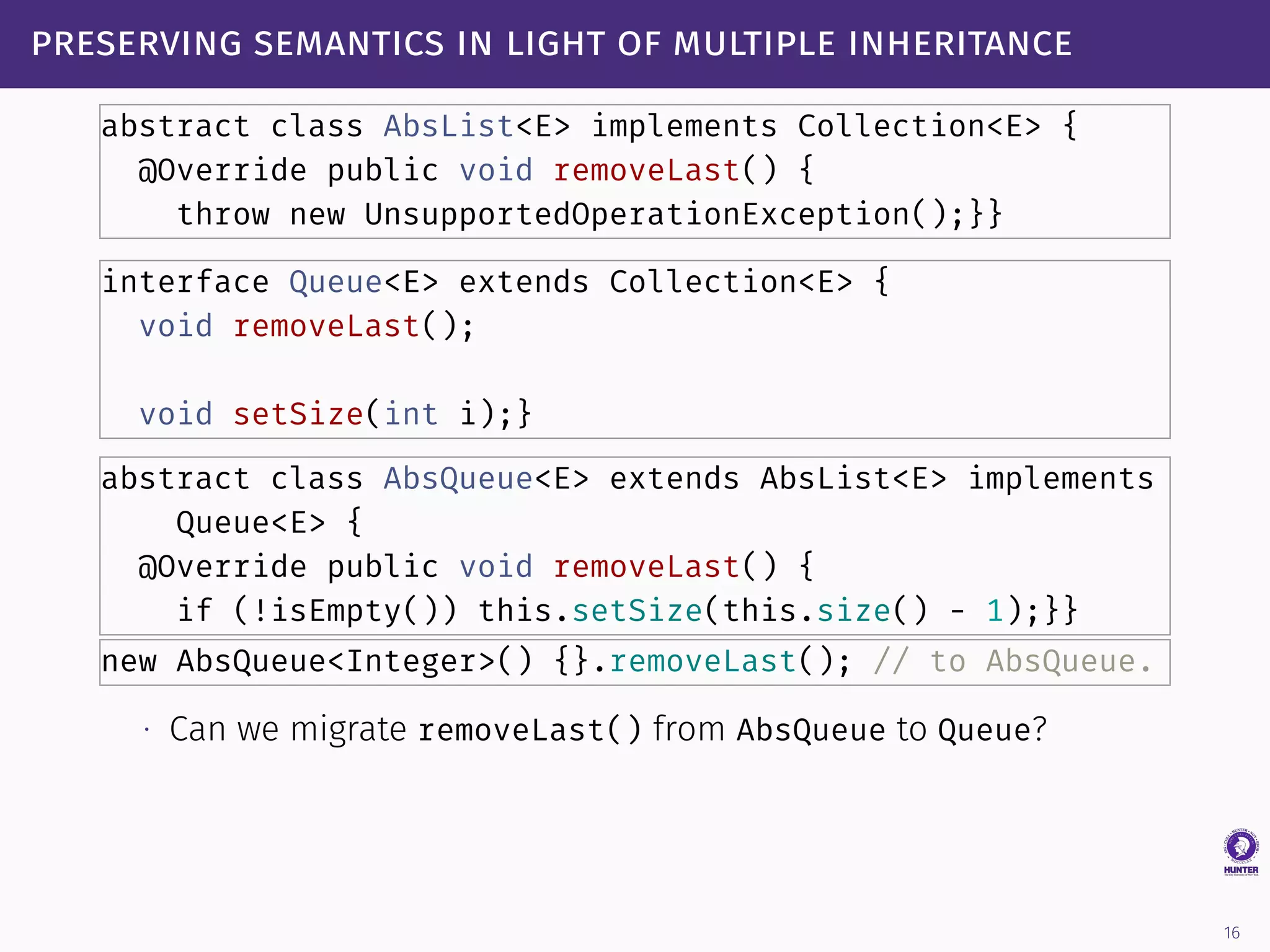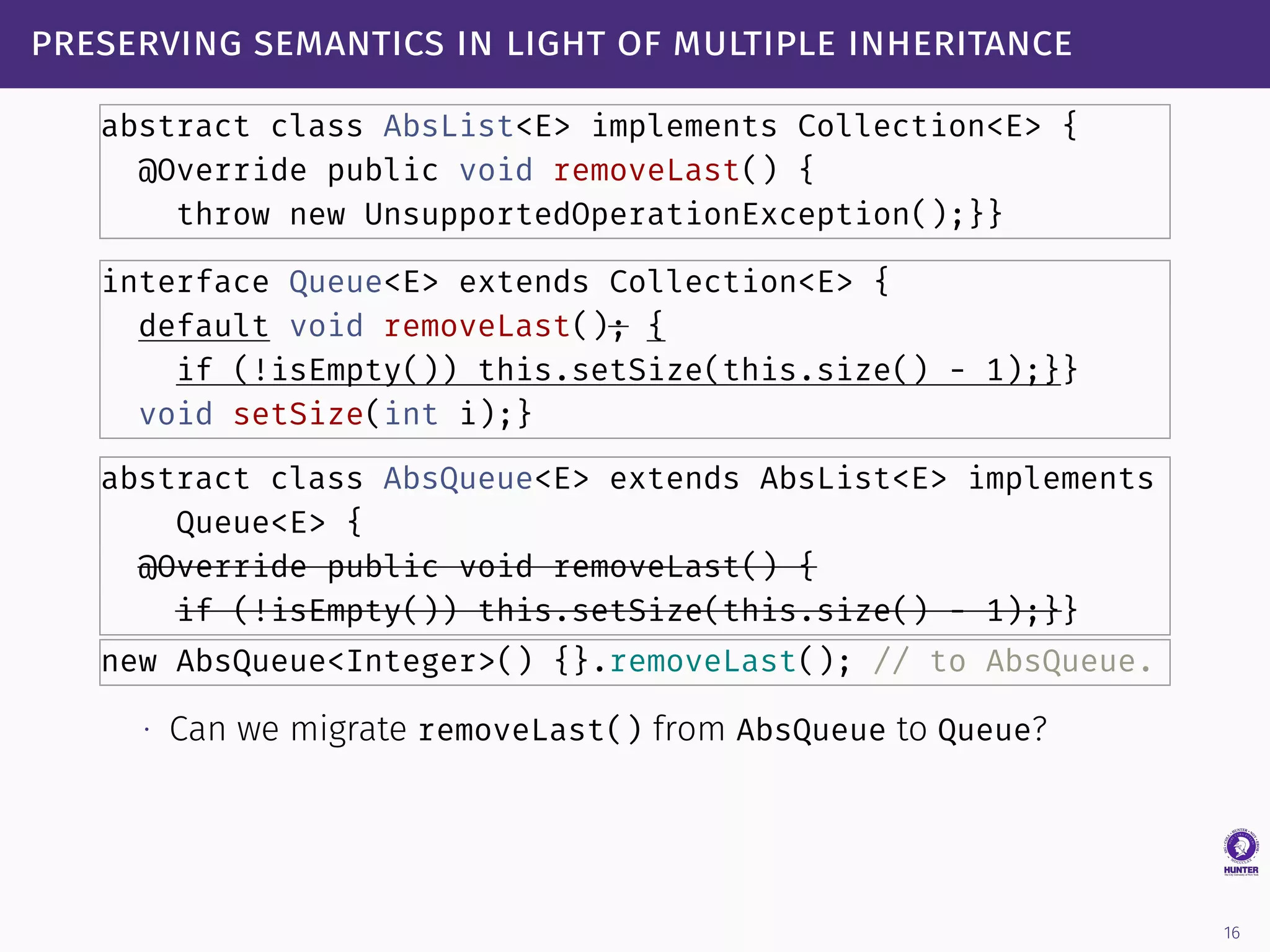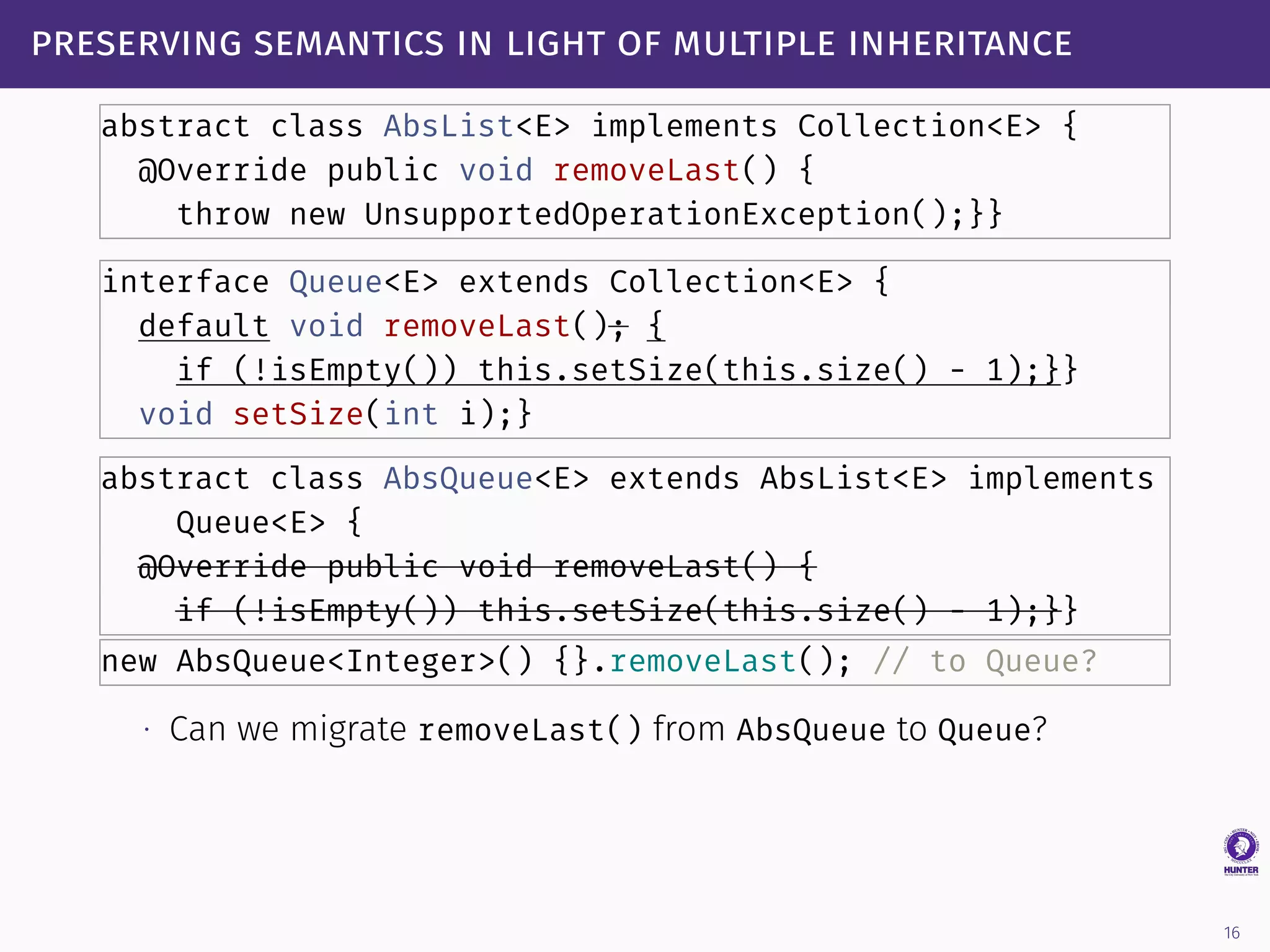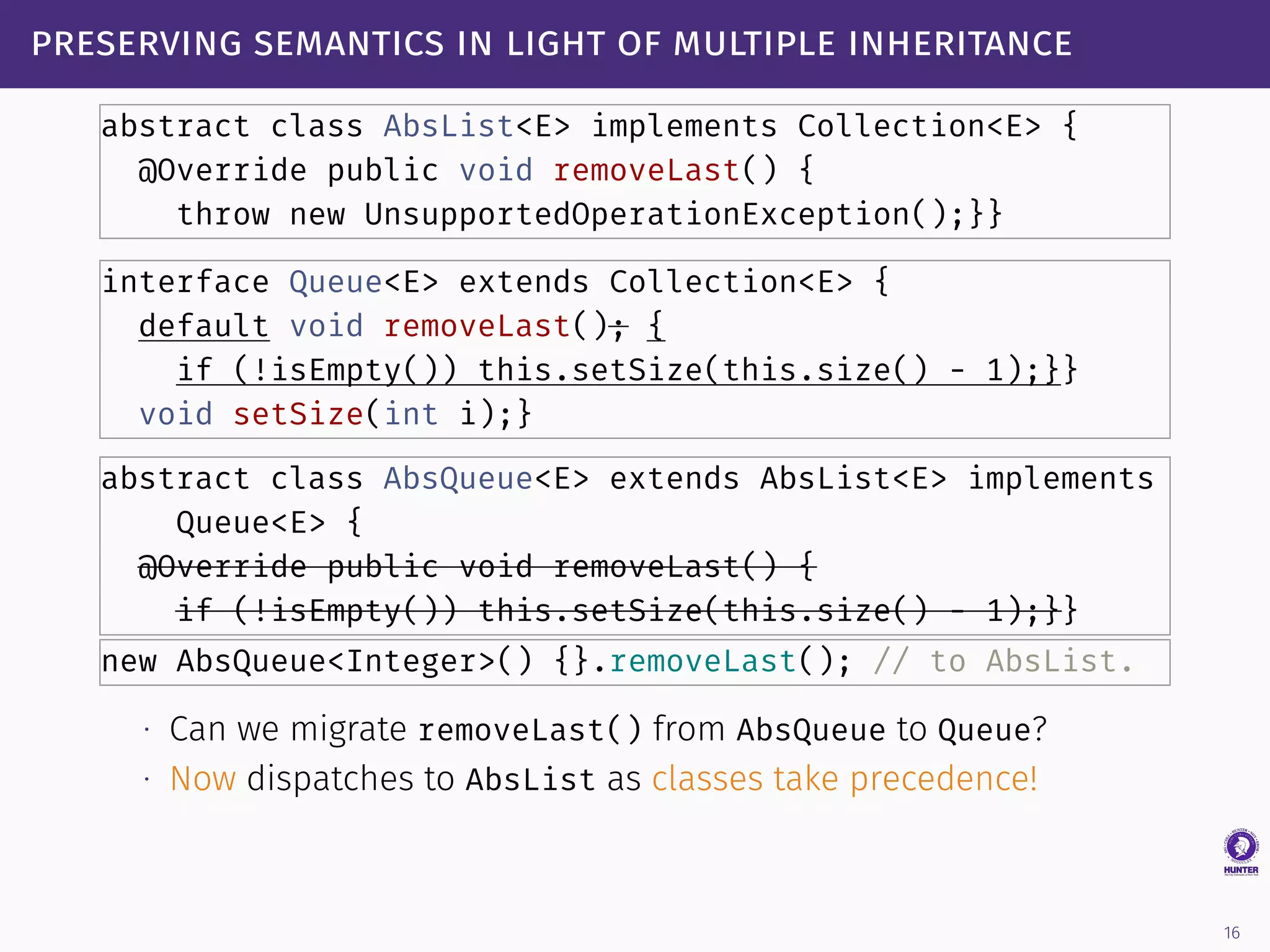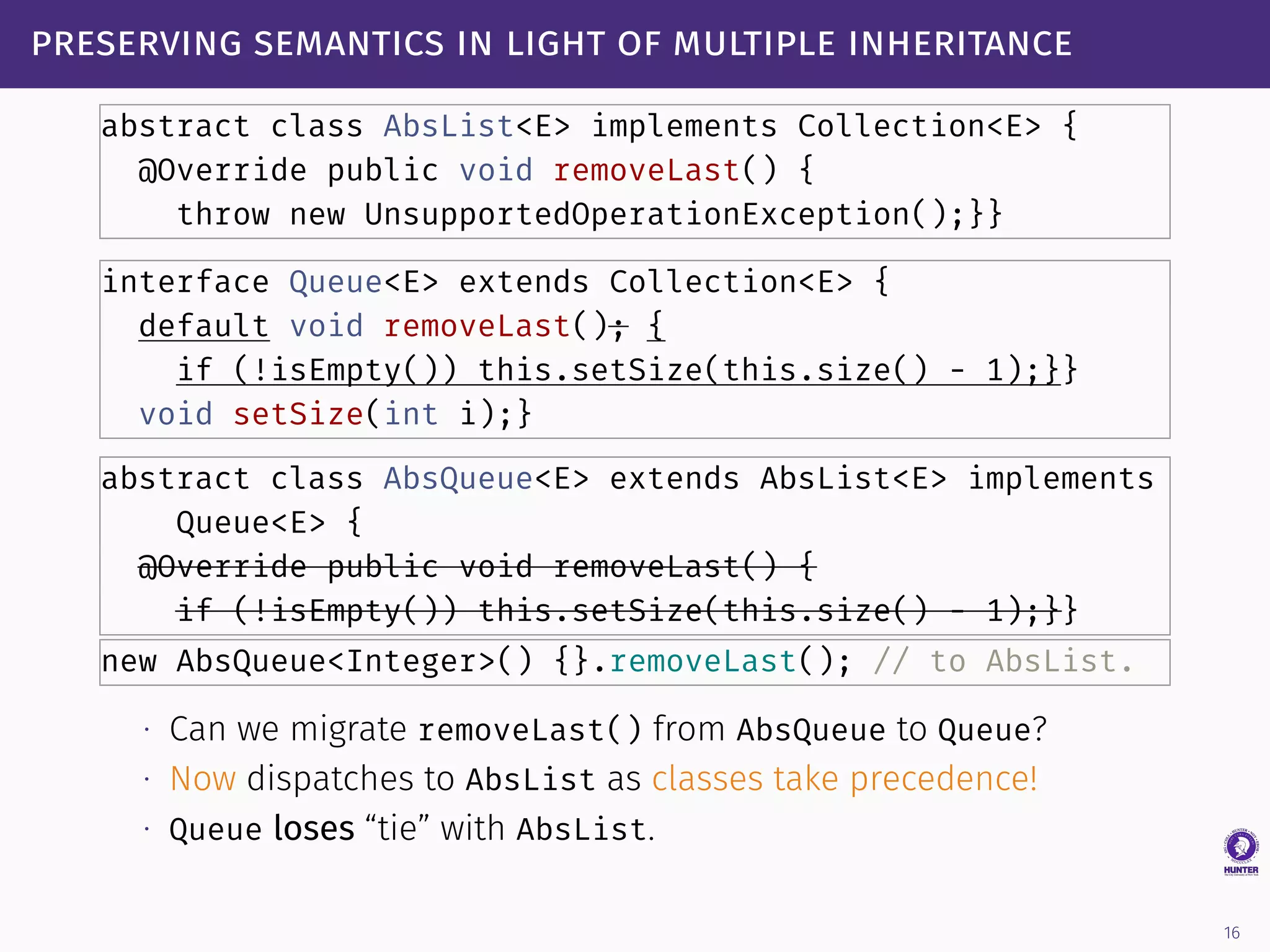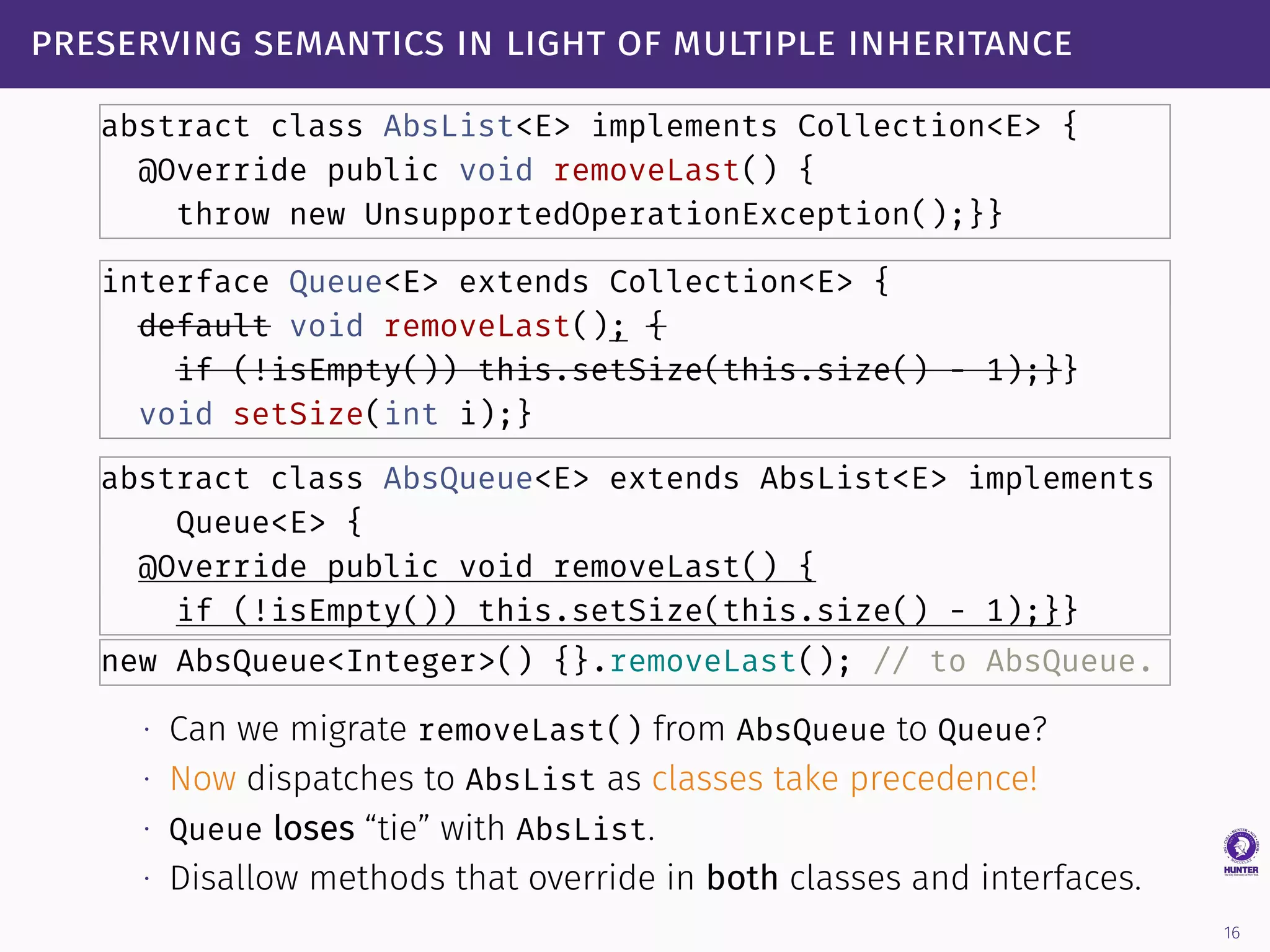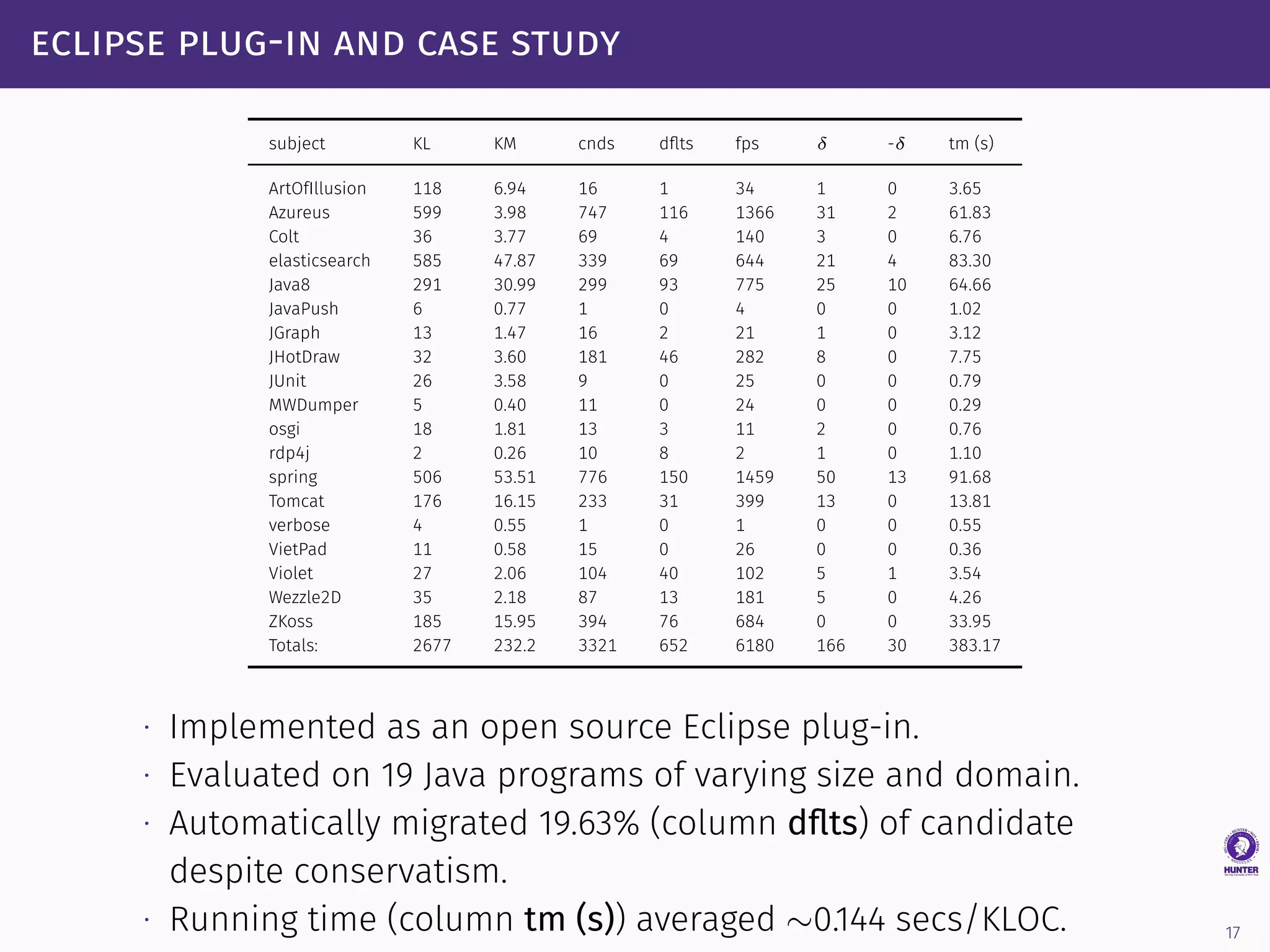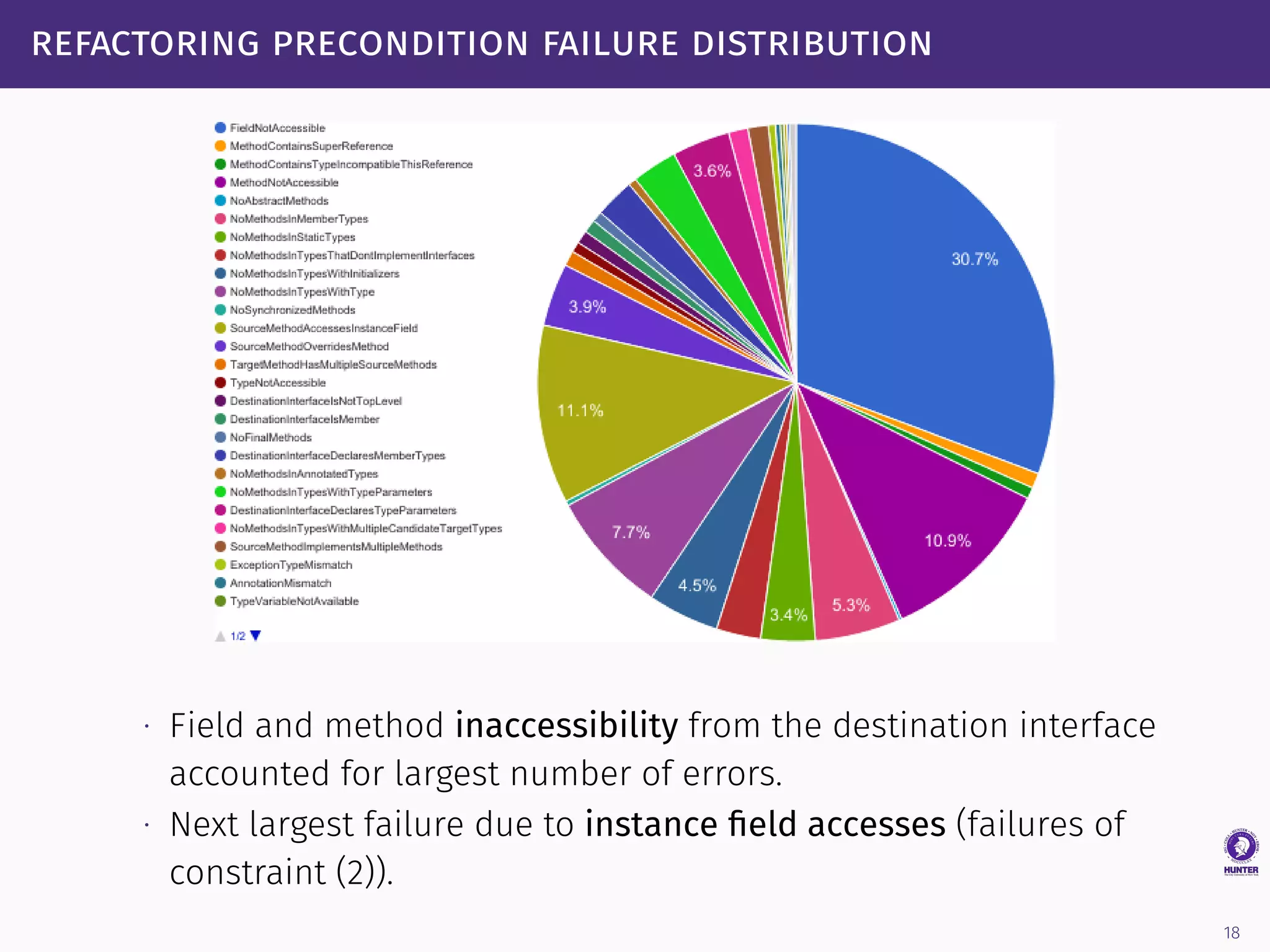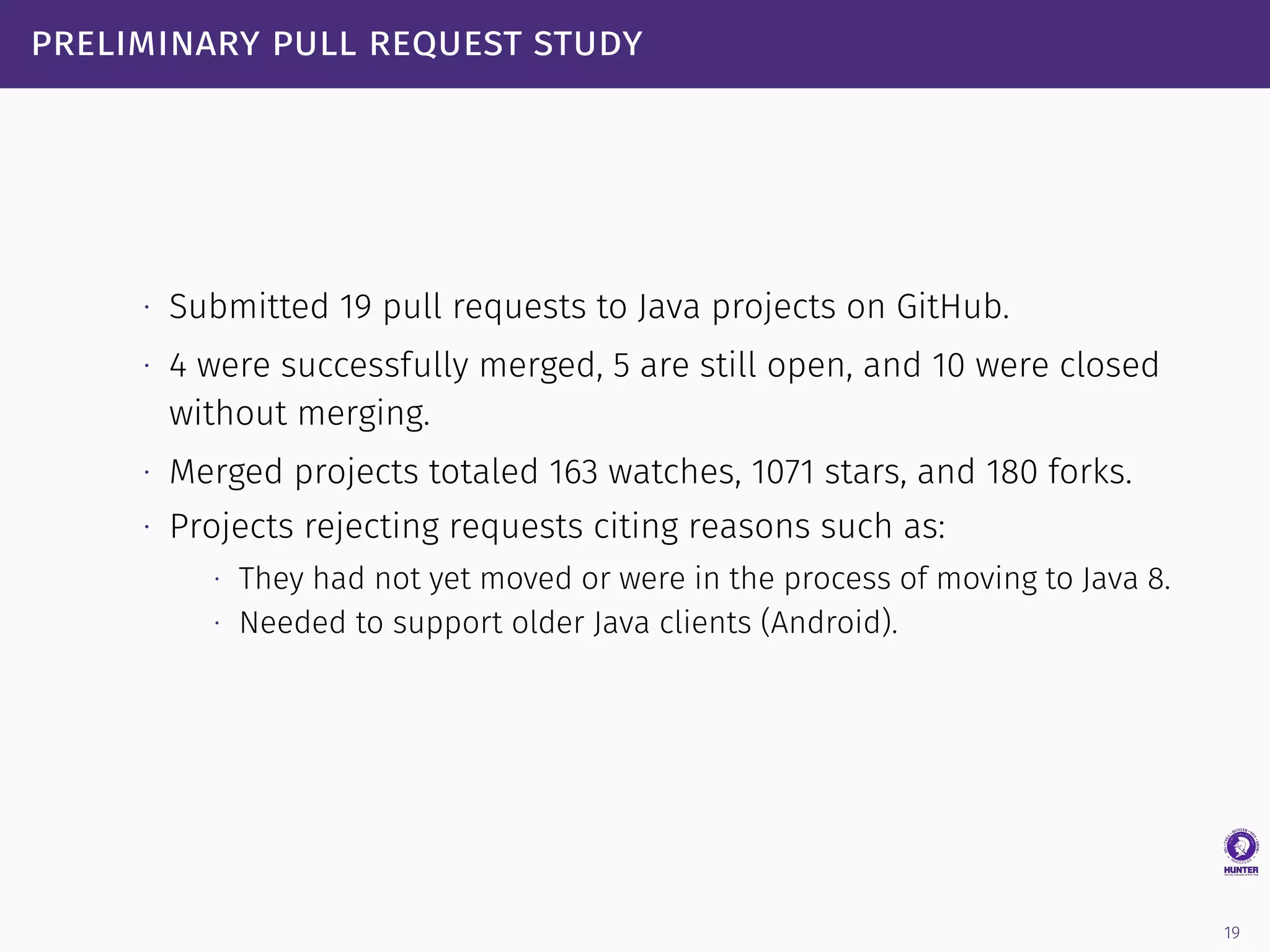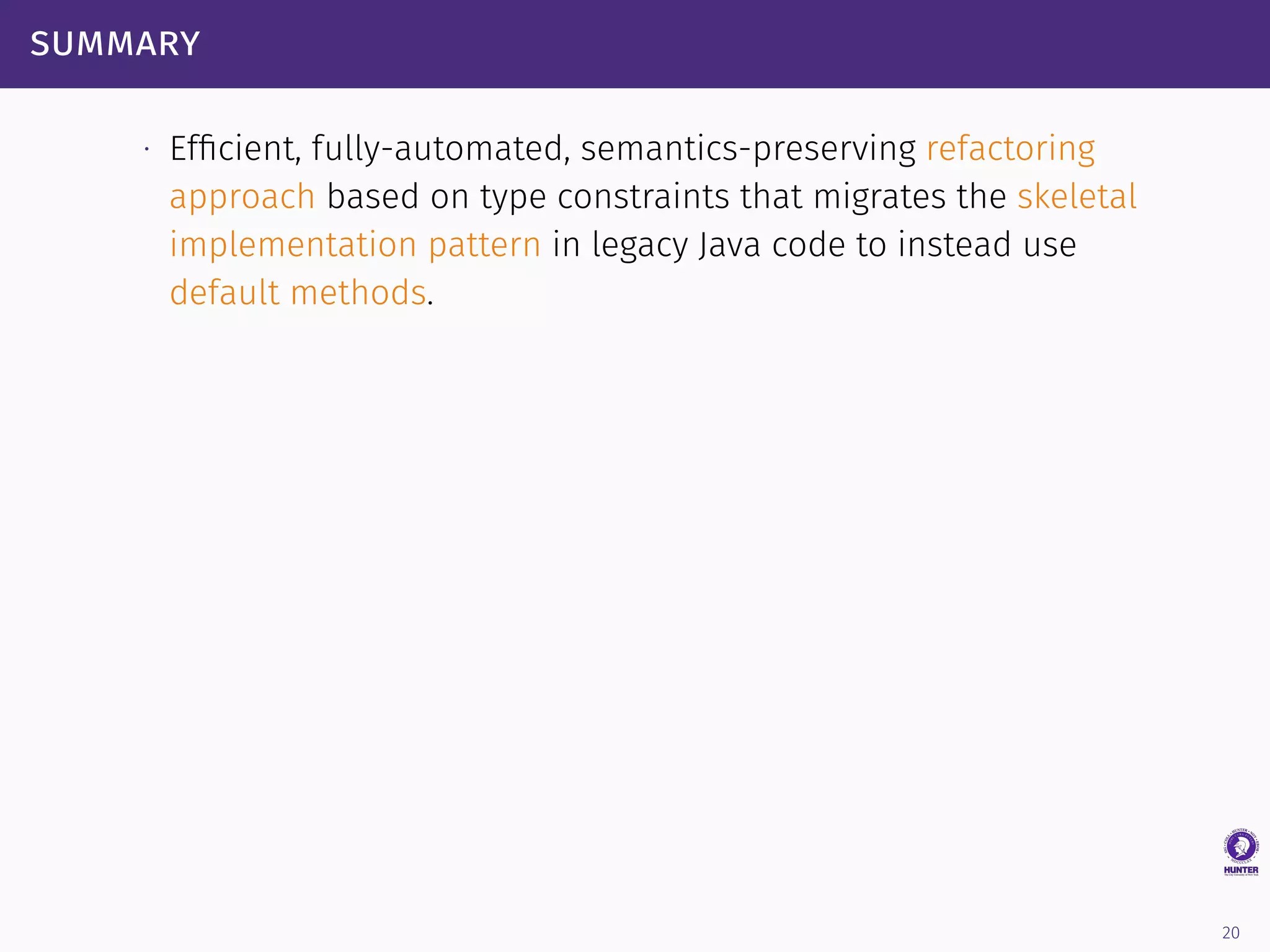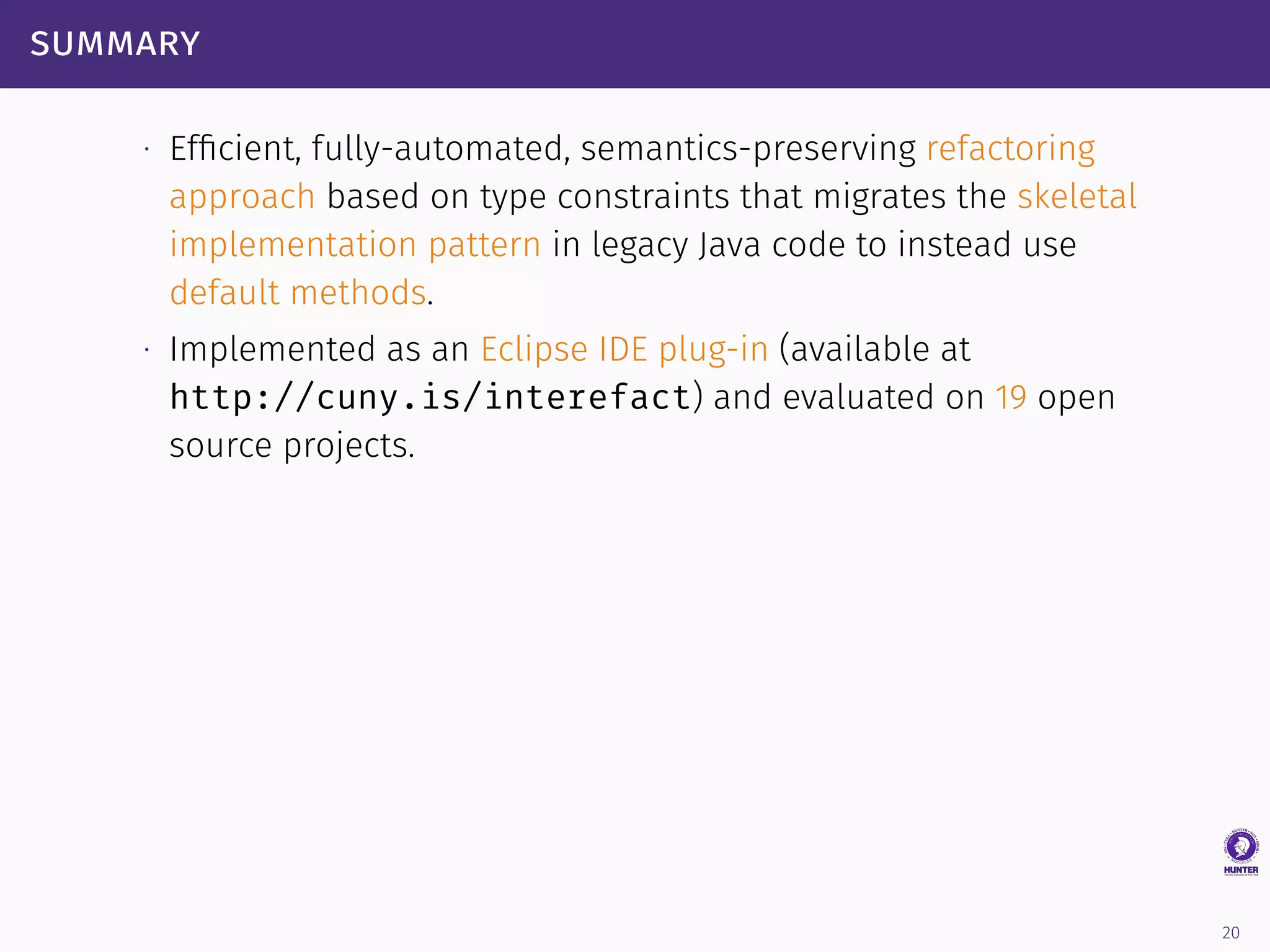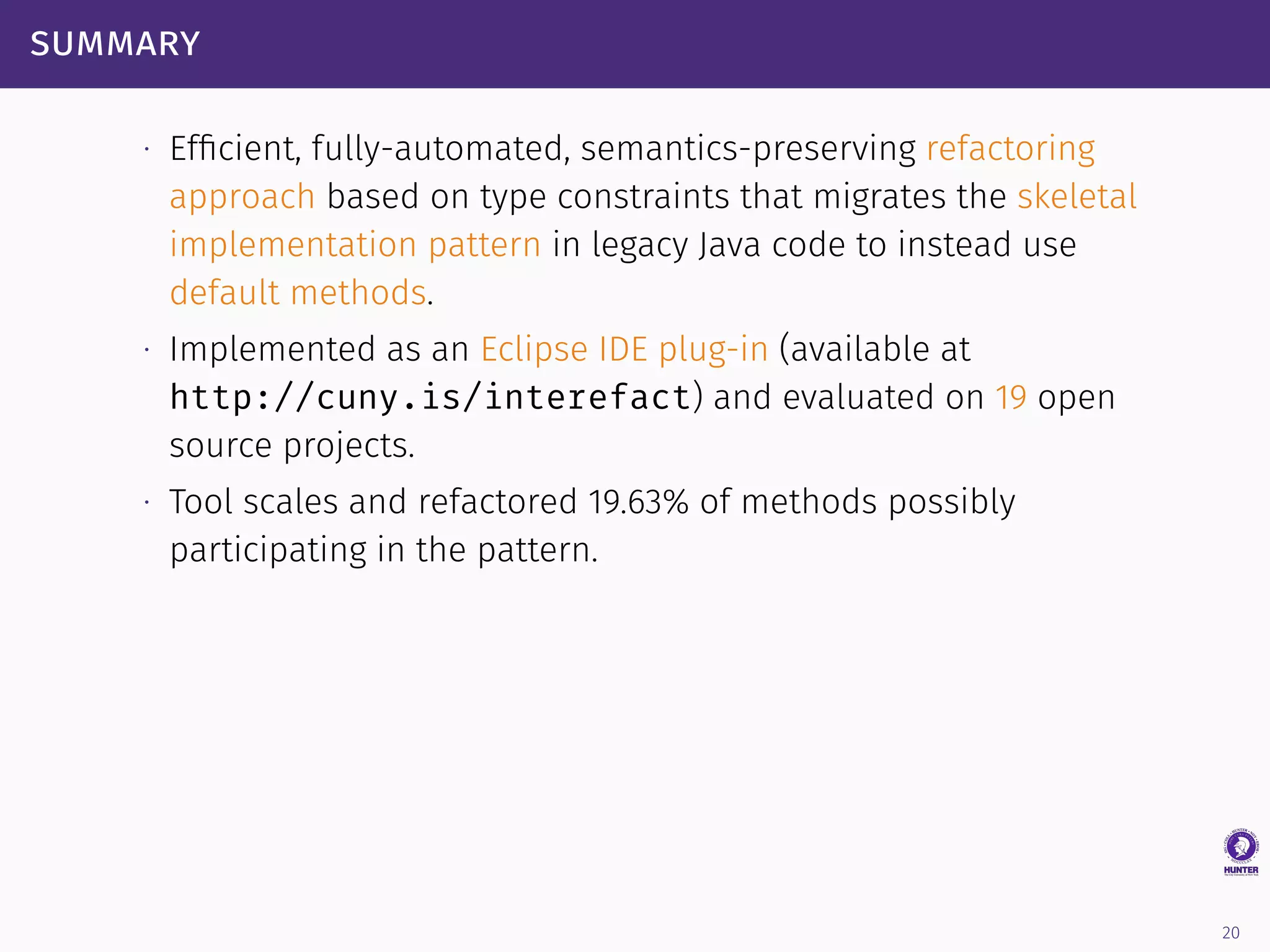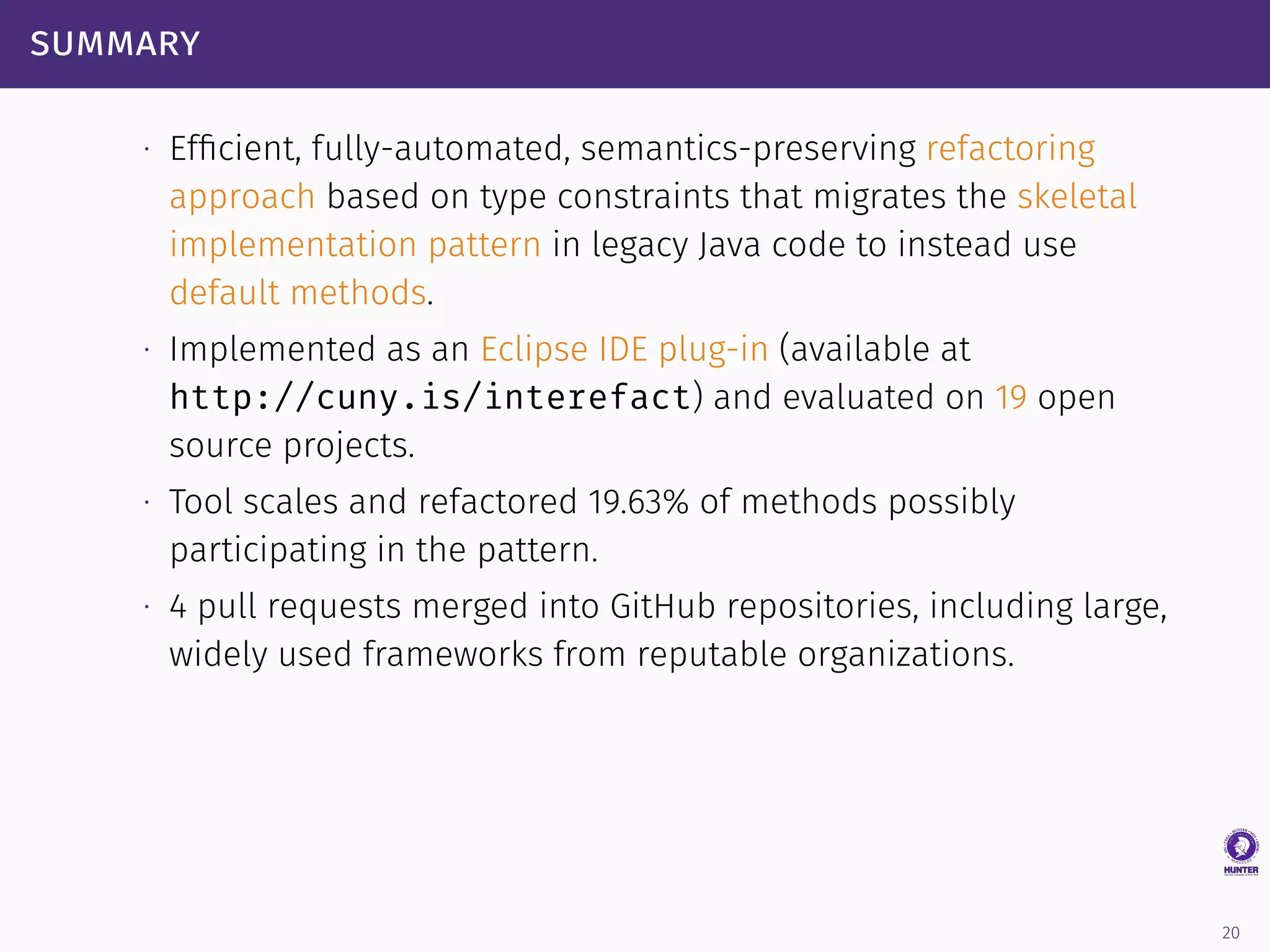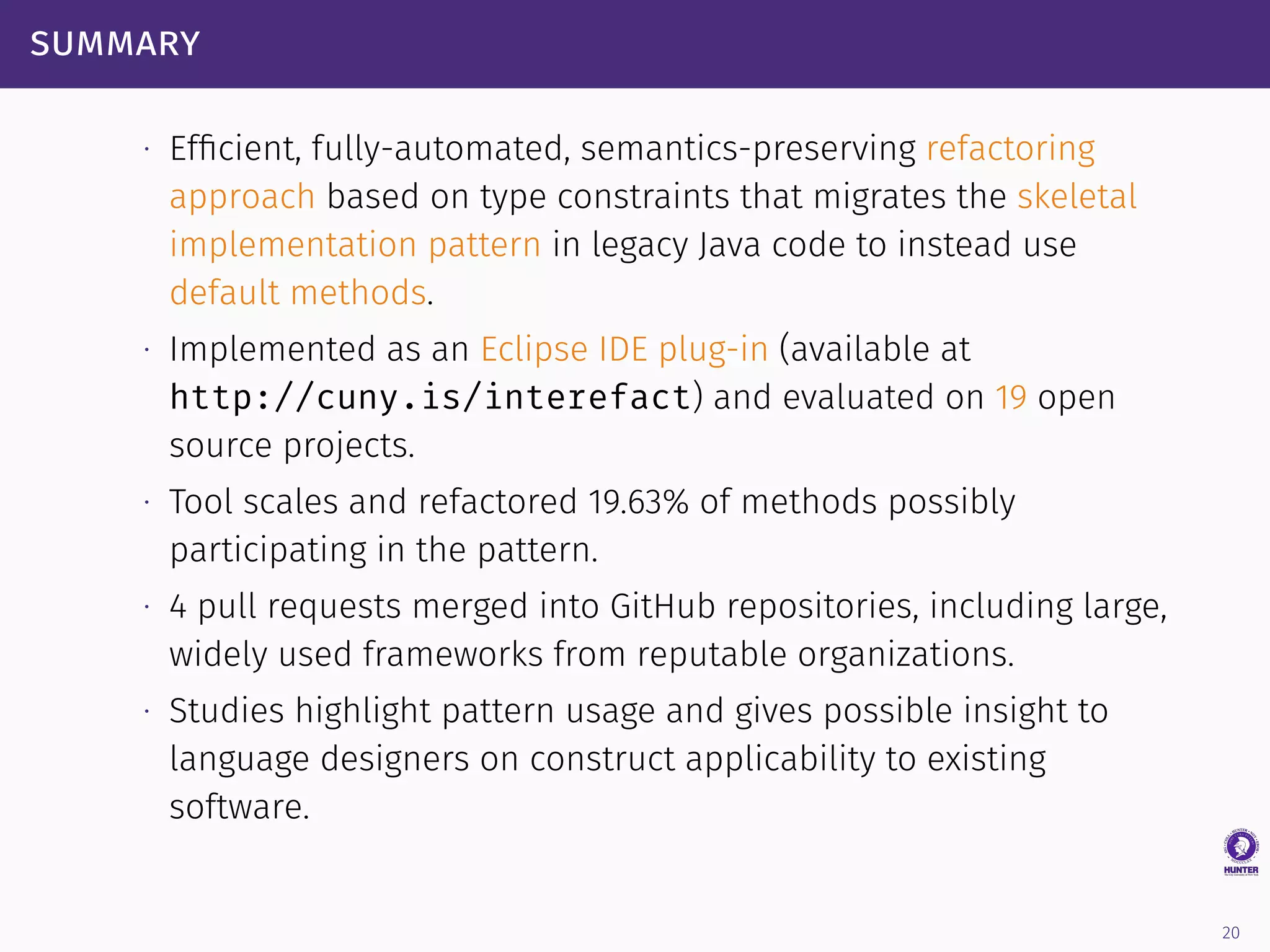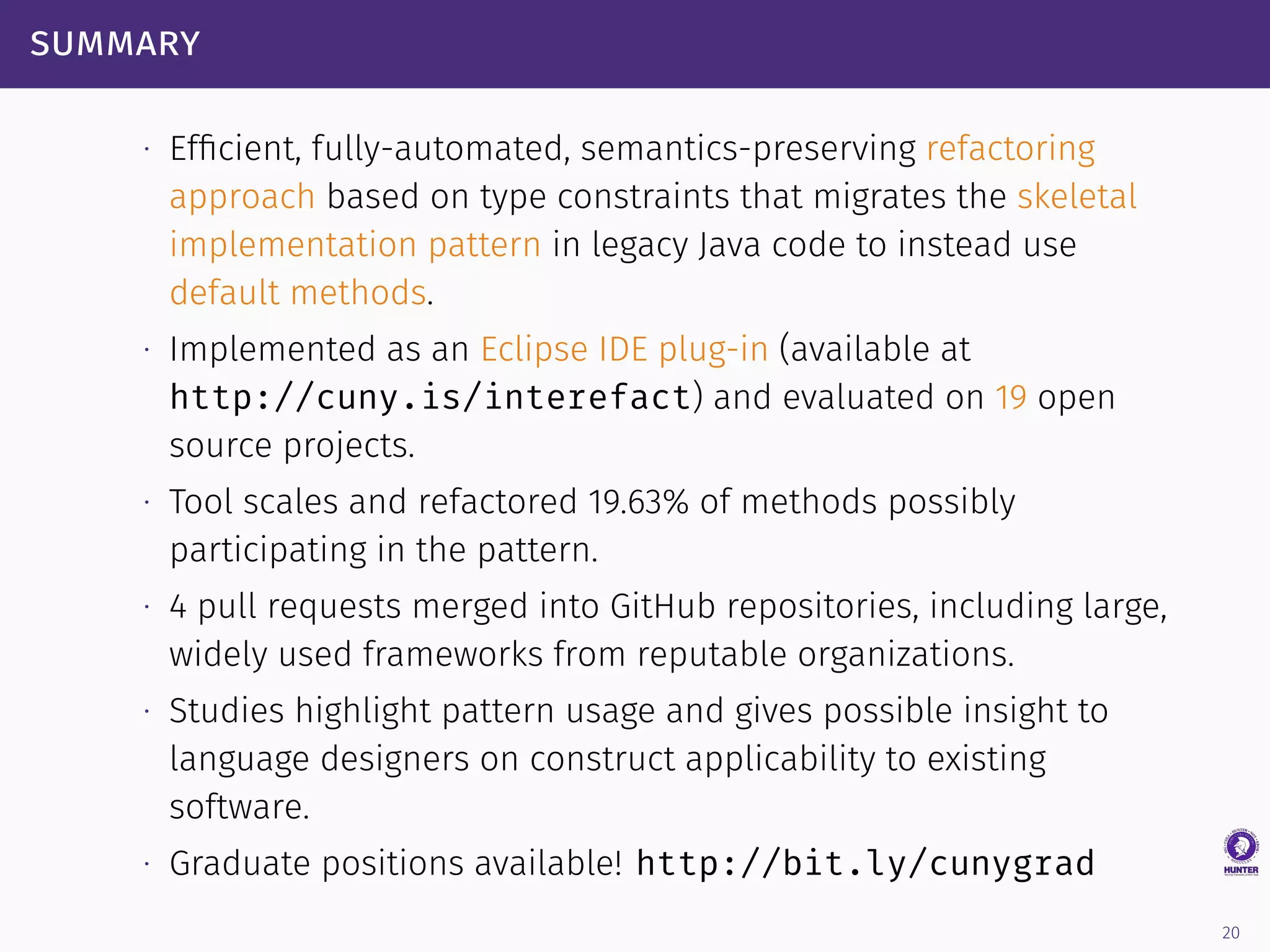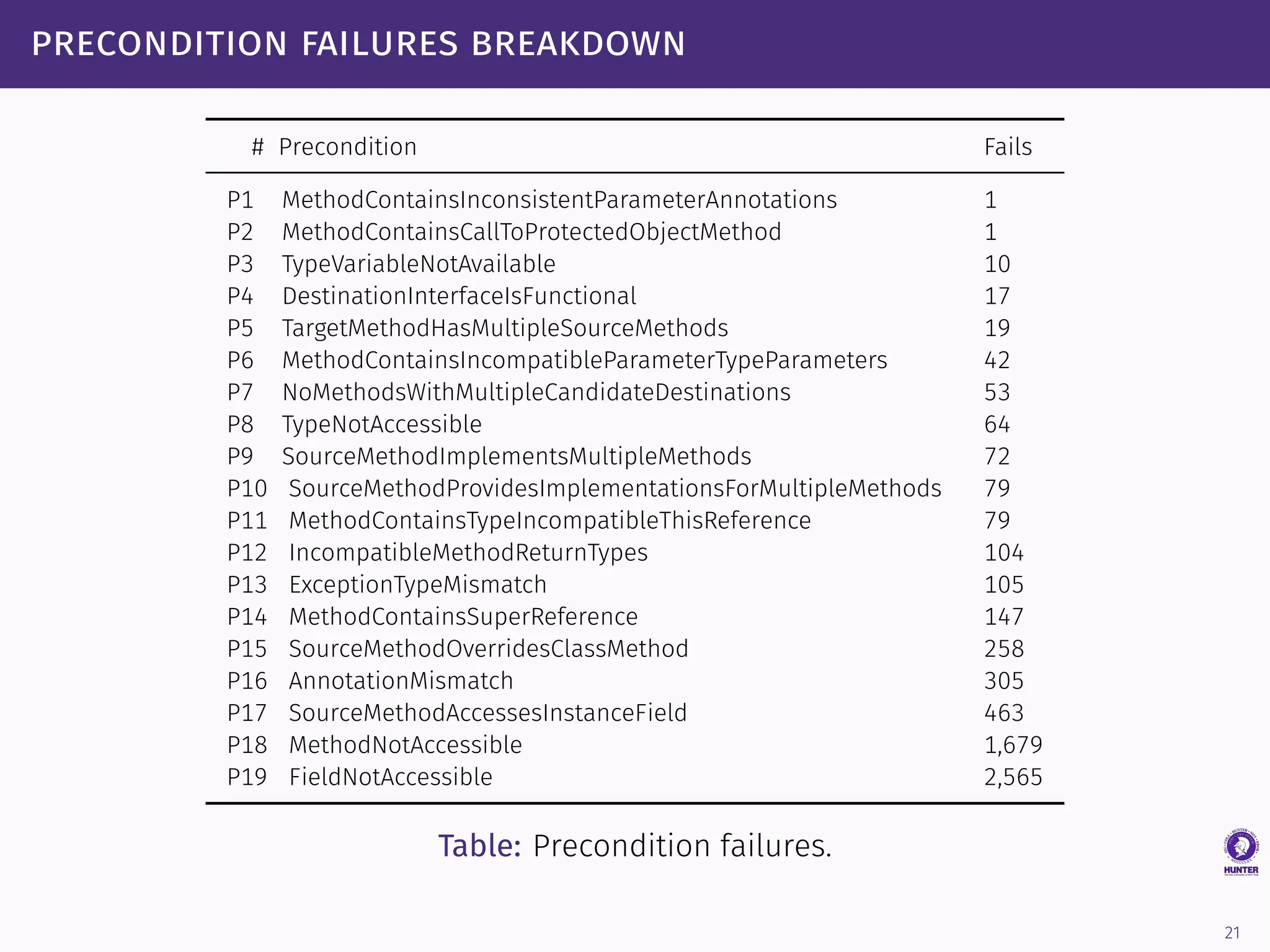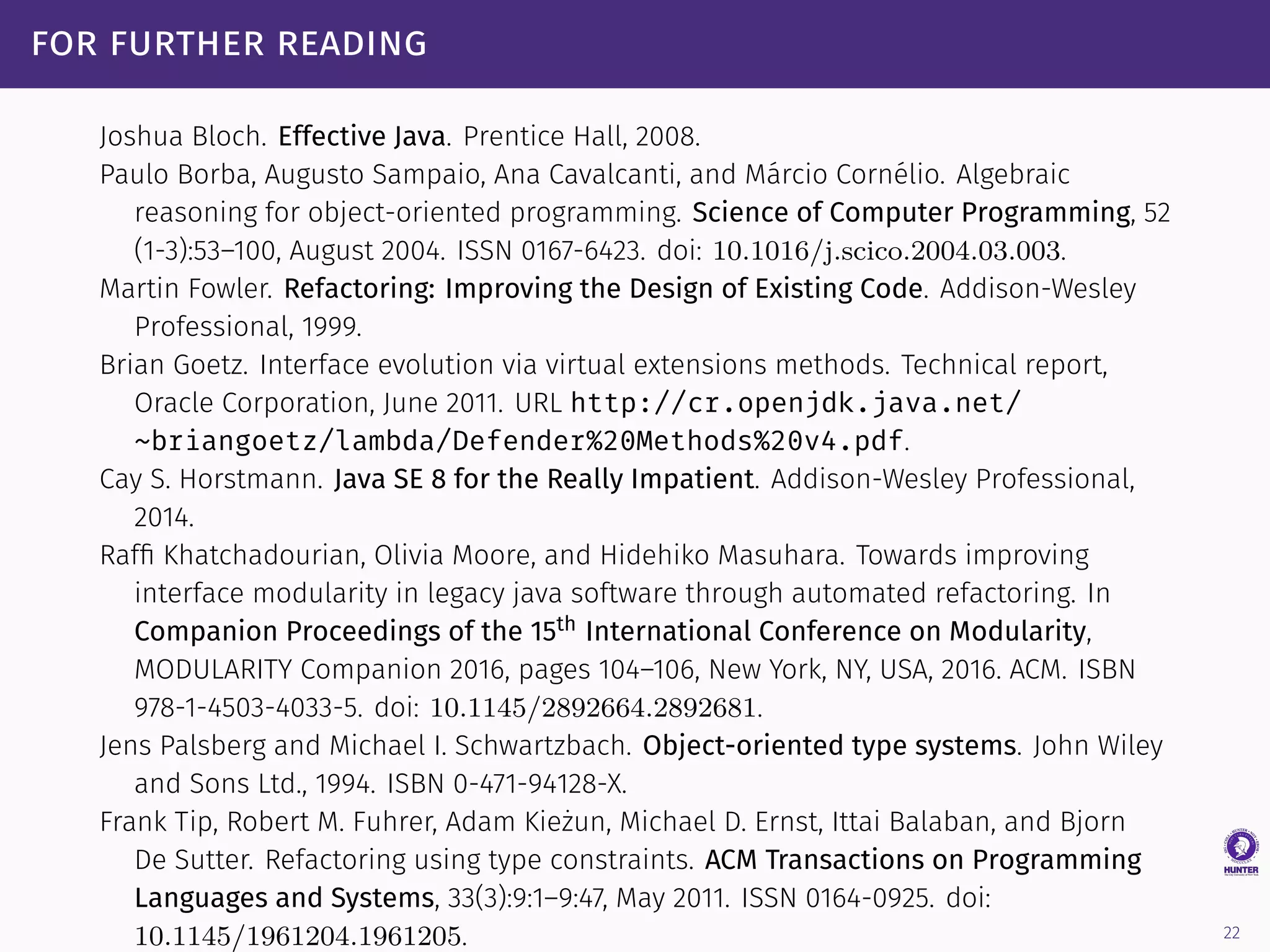This document discusses the automated refactoring of legacy Java software to use Java 8's default methods instead of the traditional skeletal implementation pattern. It highlights the limitations of the skeletal implementation, such as inheritance issues and maintenance complexities, while presenting default methods as a more flexible and modular solution. The migration to this new approach is mentioned to be challenging, particularly for large projects, due to the need for careful analysis of type hierarchies and method compatibility.
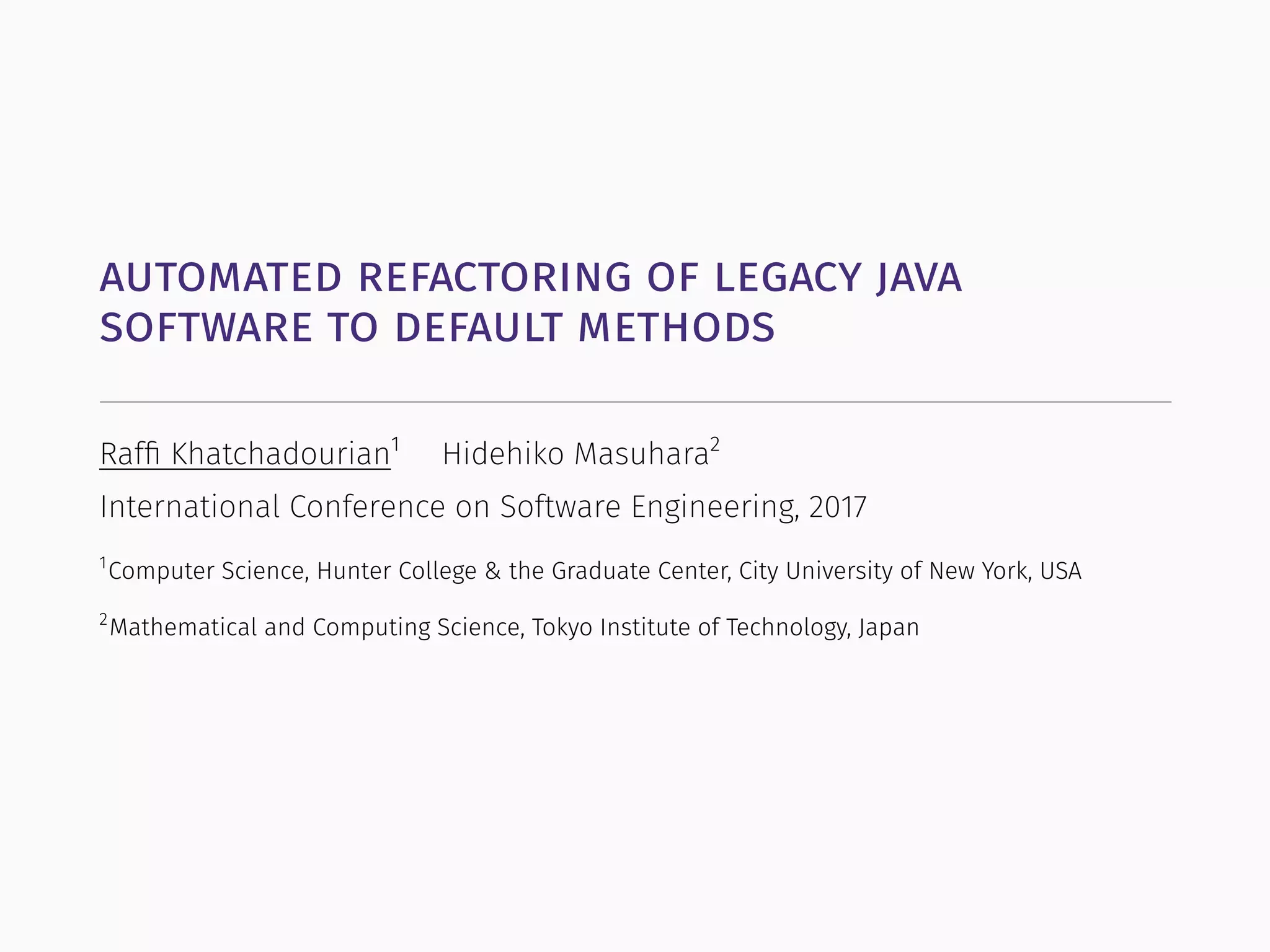

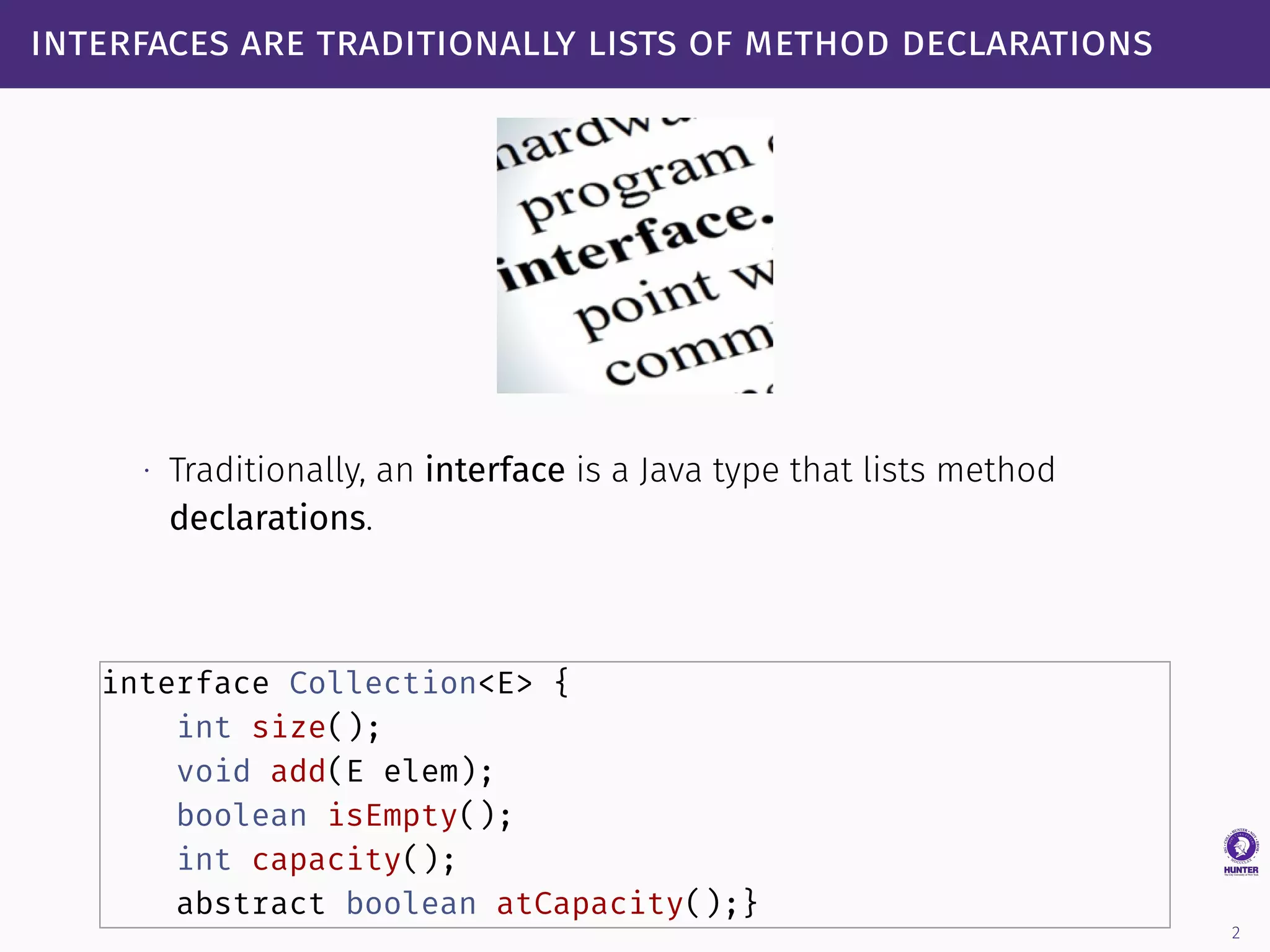
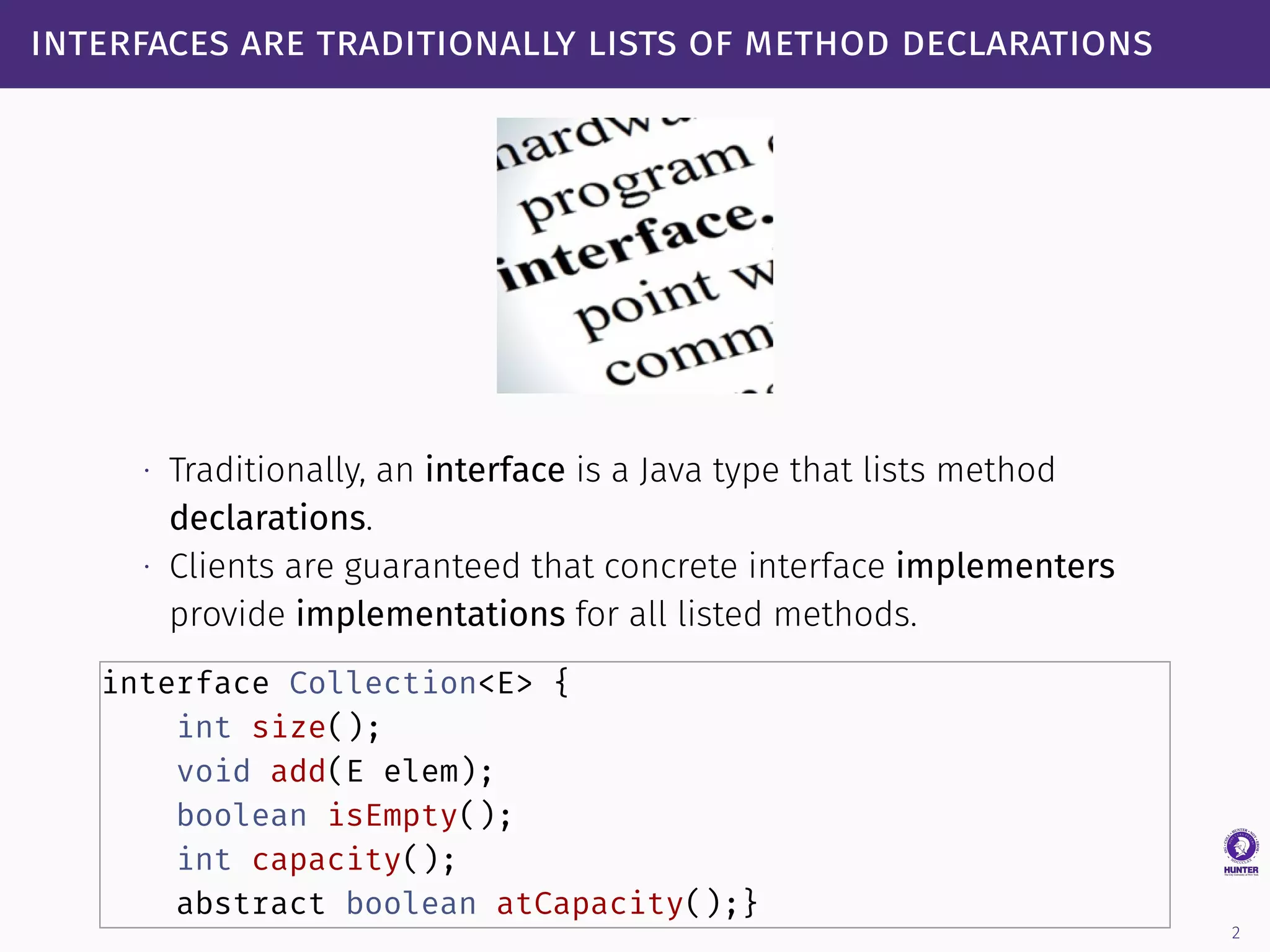
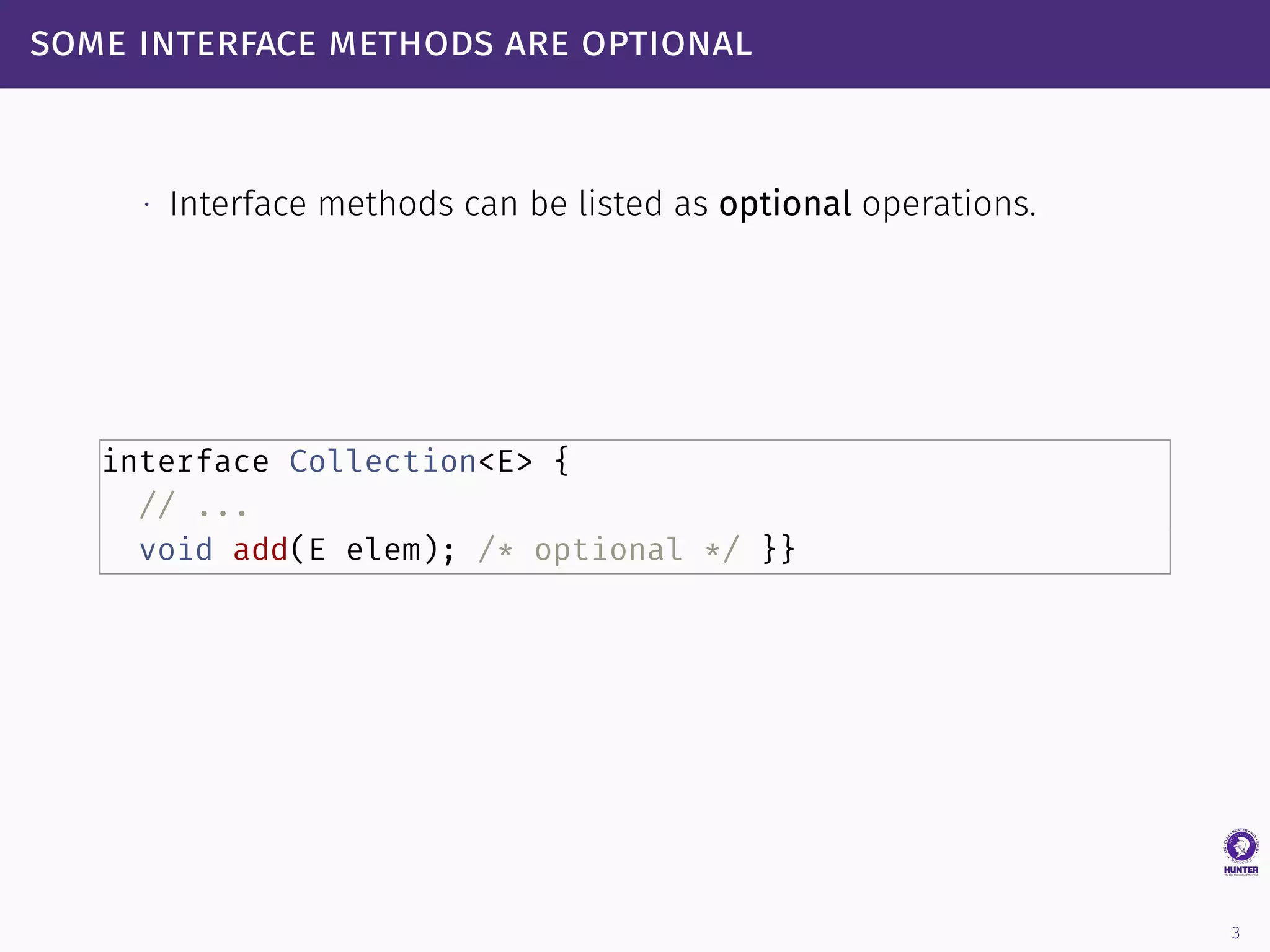
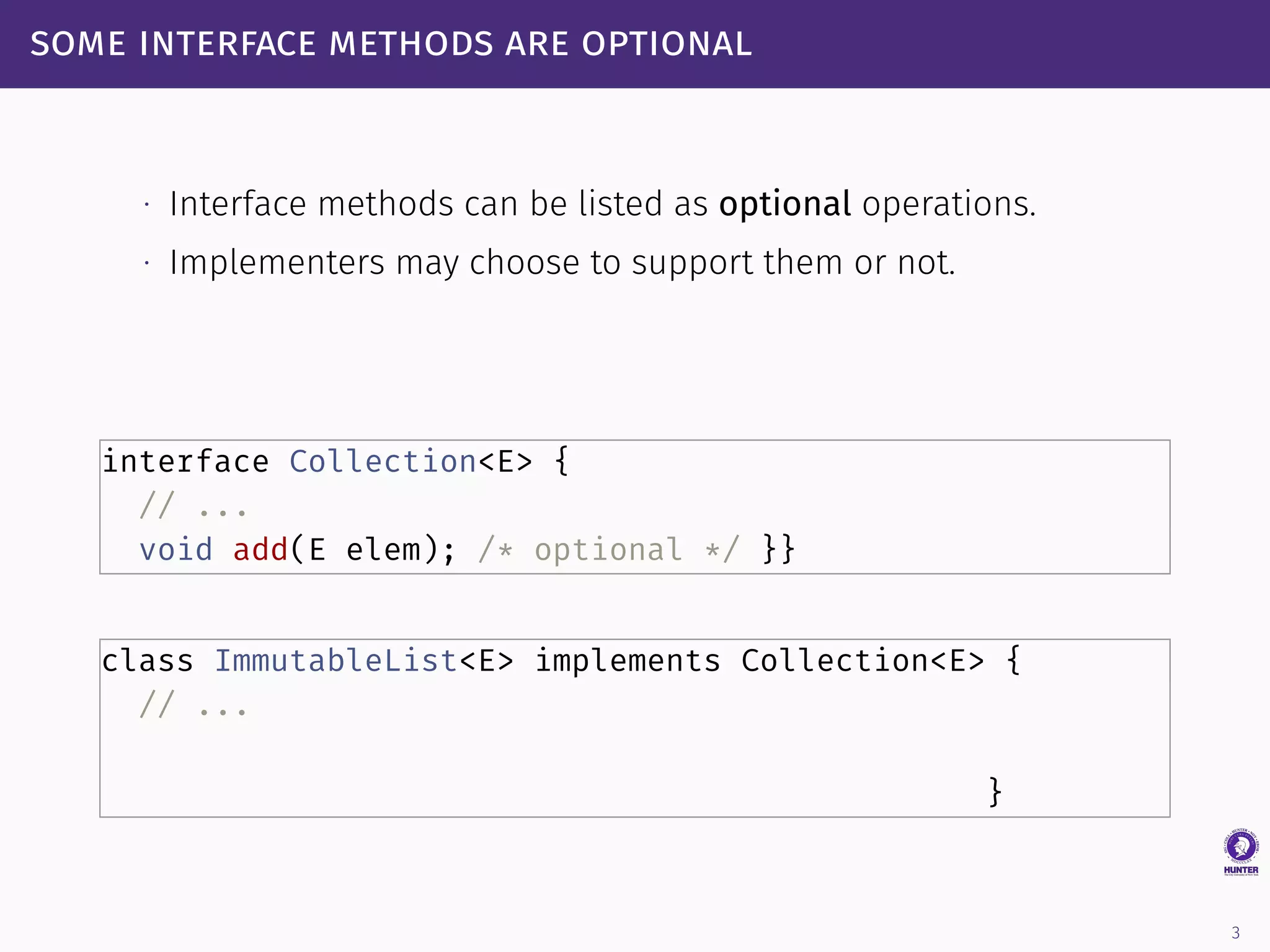
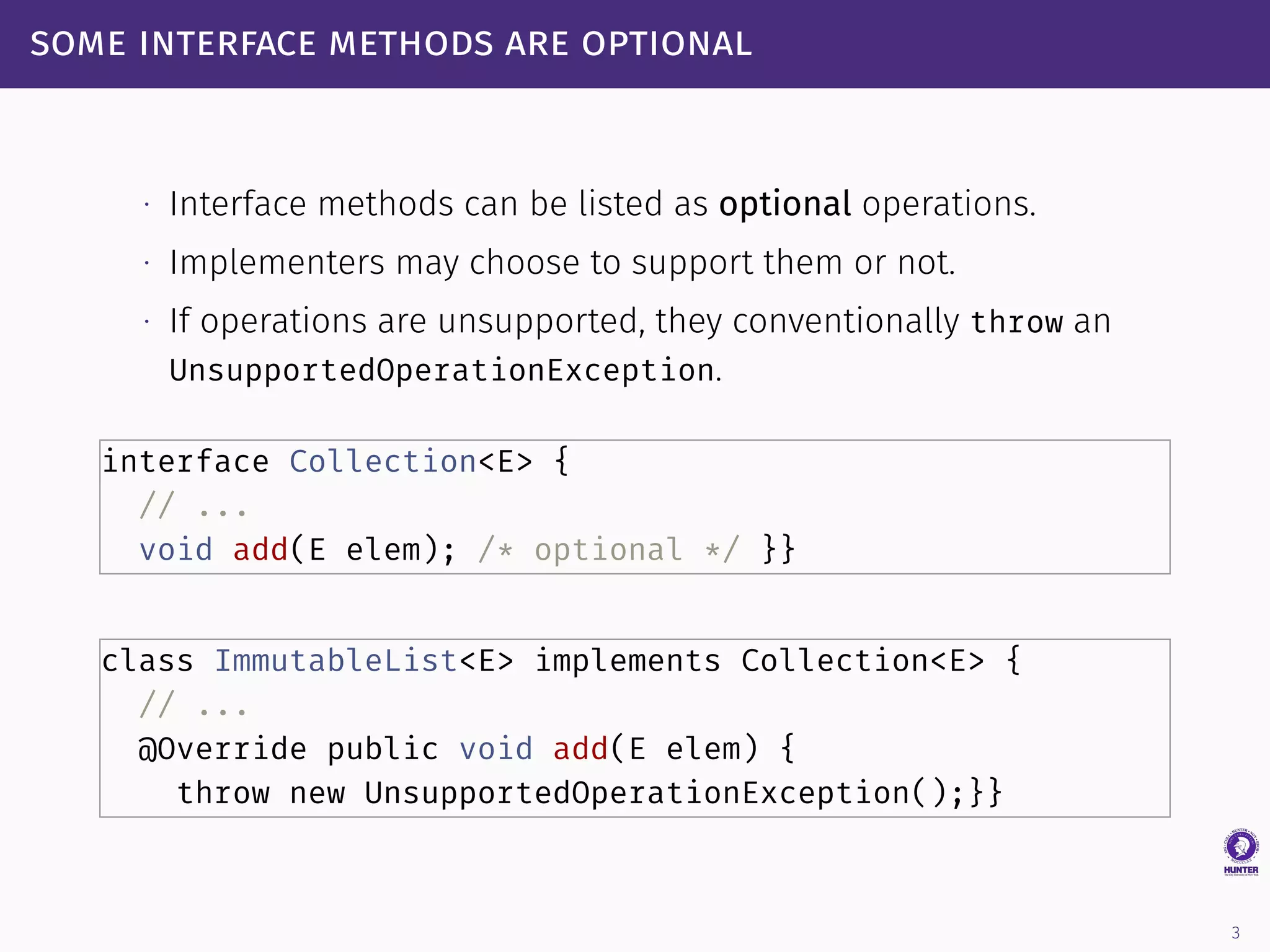
![skeletal implementation classes help implement interfaces ∙ The skeletal implementation design pattern [Bloch, 2008] is used to make implementing interfaces easier. 4](https://image.slidesharecdn.com/paper-170524211242/75/Automated-Refactoring-of-Legacy-Java-Software-to-Default-Methods-Talk-at-ICSE-2017-8-2048.jpg)
![skeletal implementation classes help implement interfaces ∙ The skeletal implementation design pattern [Bloch, 2008] is used to make implementing interfaces easier. ∙ Abstract skeletal implementation class provides partial implementations. abstract class AbstractImmutableList<E> implements Collection<E> { @Override public void add(E elem) { throw new UnsupportedOperationException();}} 4](https://image.slidesharecdn.com/paper-170524211242/75/Automated-Refactoring-of-Legacy-Java-Software-to-Default-Methods-Talk-at-ICSE-2017-9-2048.jpg)
![skeletal implementation classes help implement interfaces ∙ The skeletal implementation design pattern [Bloch, 2008] is used to make implementing interfaces easier. ∙ Abstract skeletal implementation class provides partial implementations. ∙ Implementers extend the skeletal implementation class rather than directly implementing the interface. abstract class AbstractImmutableList<E> implements Collection<E> { @Override public void add(E elem) { throw new UnsupportedOperationException();}} class ImmutableList<E> extends AbstractImmutableList<E>{ // ... @Override public void add(E elem) { throw new UnsupportedOperationException();}}} 4](https://image.slidesharecdn.com/paper-170524211242/75/Automated-Refactoring-of-Legacy-Java-Software-to-Default-Methods-Talk-at-ICSE-2017-10-2048.jpg)
![the skeletal implementation pattern has several drawbacks The skeletal implementation pattern has several drawbacks: Inheritance ImmutableList cannot: ∙ Subclass another class. ∙ Inherit skeletal implementations split over multiple classes [Horstmann, 2014]. ∙ Inherit skeletal implementations for multiple interfaces. Modularity No syntactic path between Collection and AbstractCollection (may require global analysis [Khatchadourian et al., 2016]). Bloat ∙ Separate classes can complicate libraries, making maintenance difficult. ∙ Method declarations needed in both interface and abstract class. 5](https://image.slidesharecdn.com/paper-170524211242/75/Automated-Refactoring-of-Legacy-Java-Software-to-Default-Methods-Talk-at-ICSE-2017-11-2048.jpg)
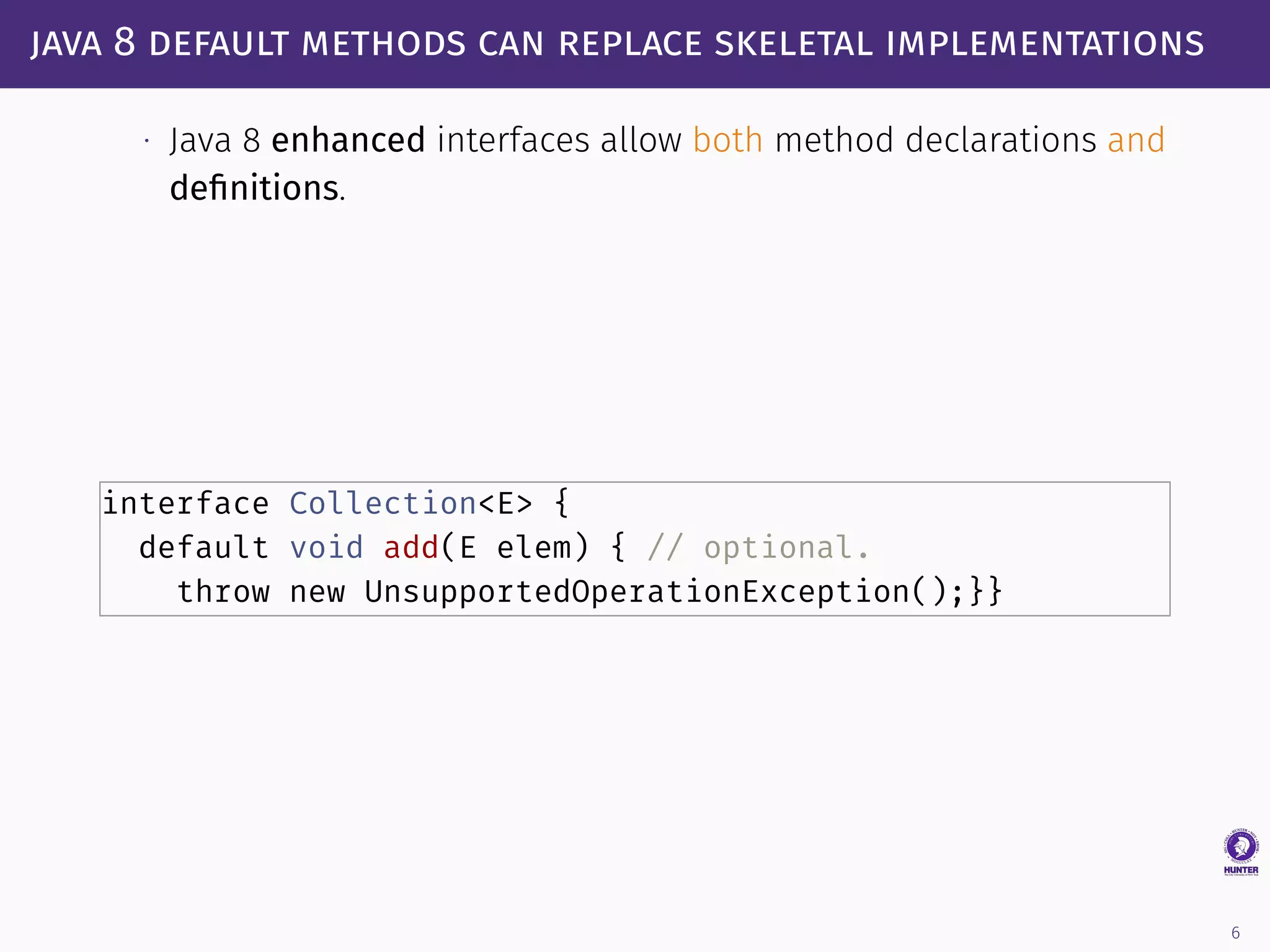
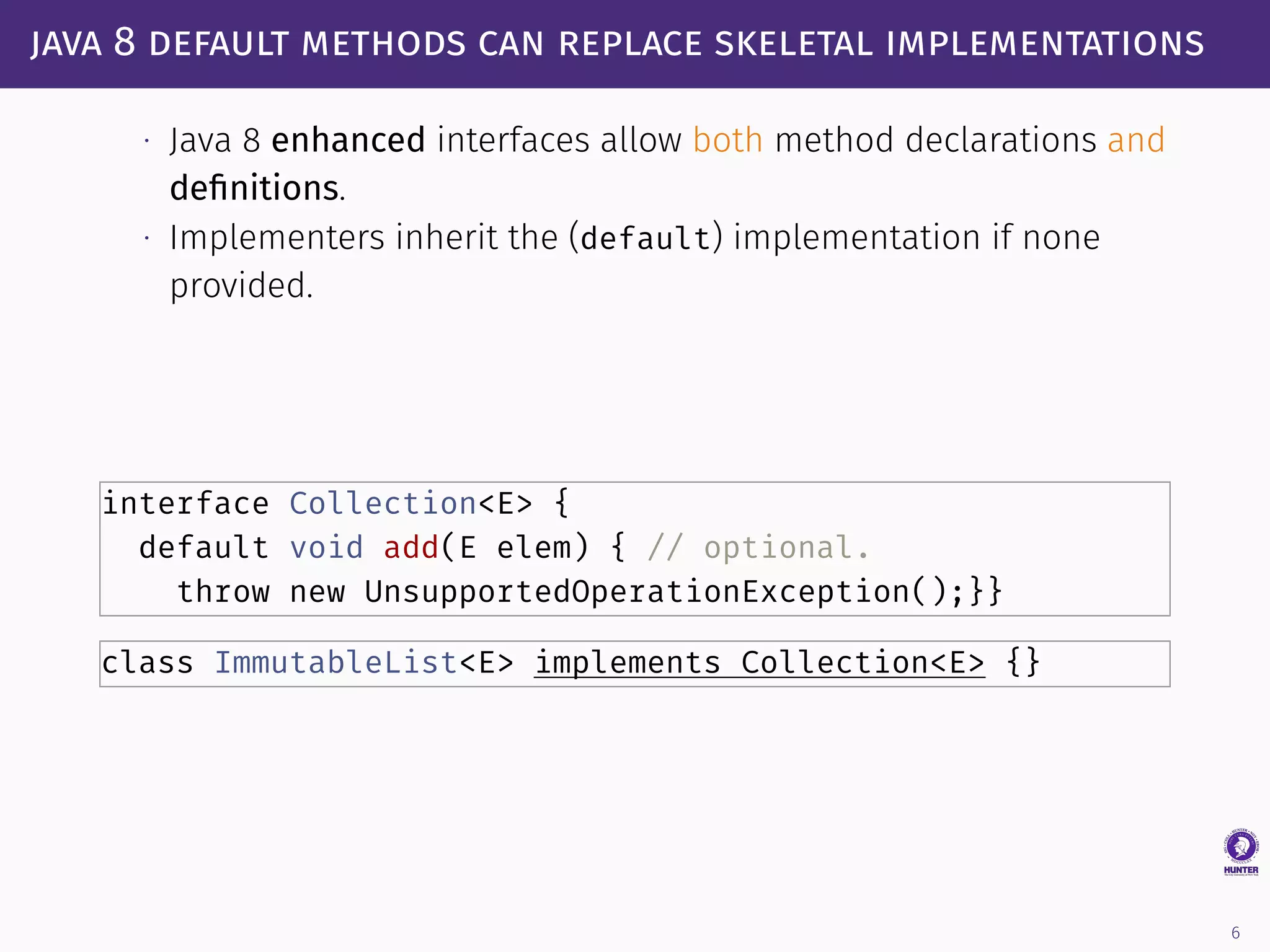
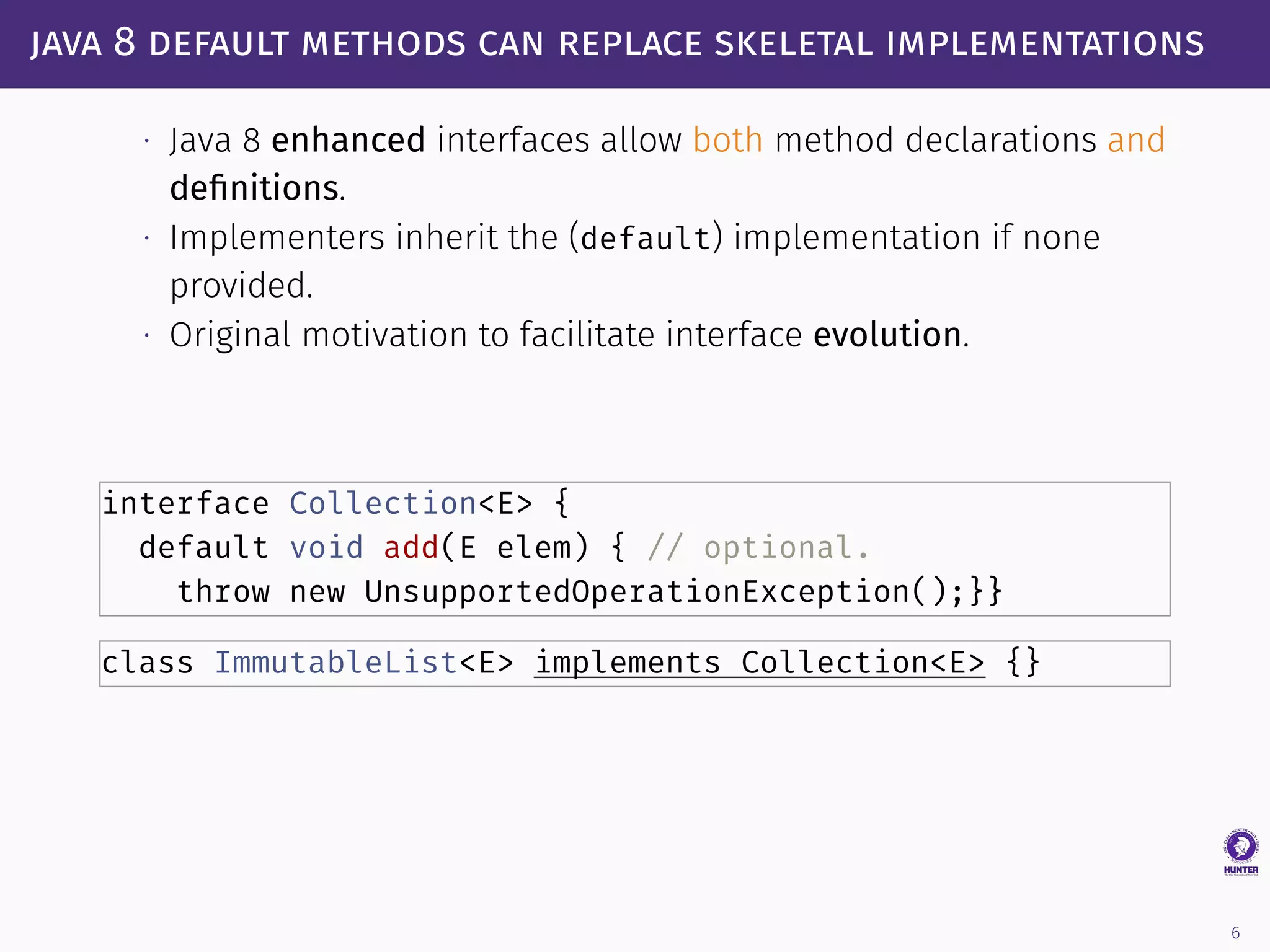
![java 8 default methods can replace skeletal implementations ∙ Java 8 enhanced interfaces allow both method declarations and definitions. ∙ Implementers inherit the (default) implementation if none provided. ∙ Original motivation to facilitate interface evolution. ∙ Can also be used as a replacement of the skeletal implementation pattern [Goetz, 2011]. interface Collection<E> { default void add(E elem) { // optional. throw new UnsupportedOperationException();}} class ImmutableList<E> implements Collection<E> {} abstract class AbstractImmutableList<E> implements Collection<E> { @Override public void add(E elem) { throw new UnsupportedOperationException();}} 6](https://image.slidesharecdn.com/paper-170524211242/75/Automated-Refactoring-of-Legacy-Java-Software-to-Default-Methods-Talk-at-ICSE-2017-15-2048.jpg)
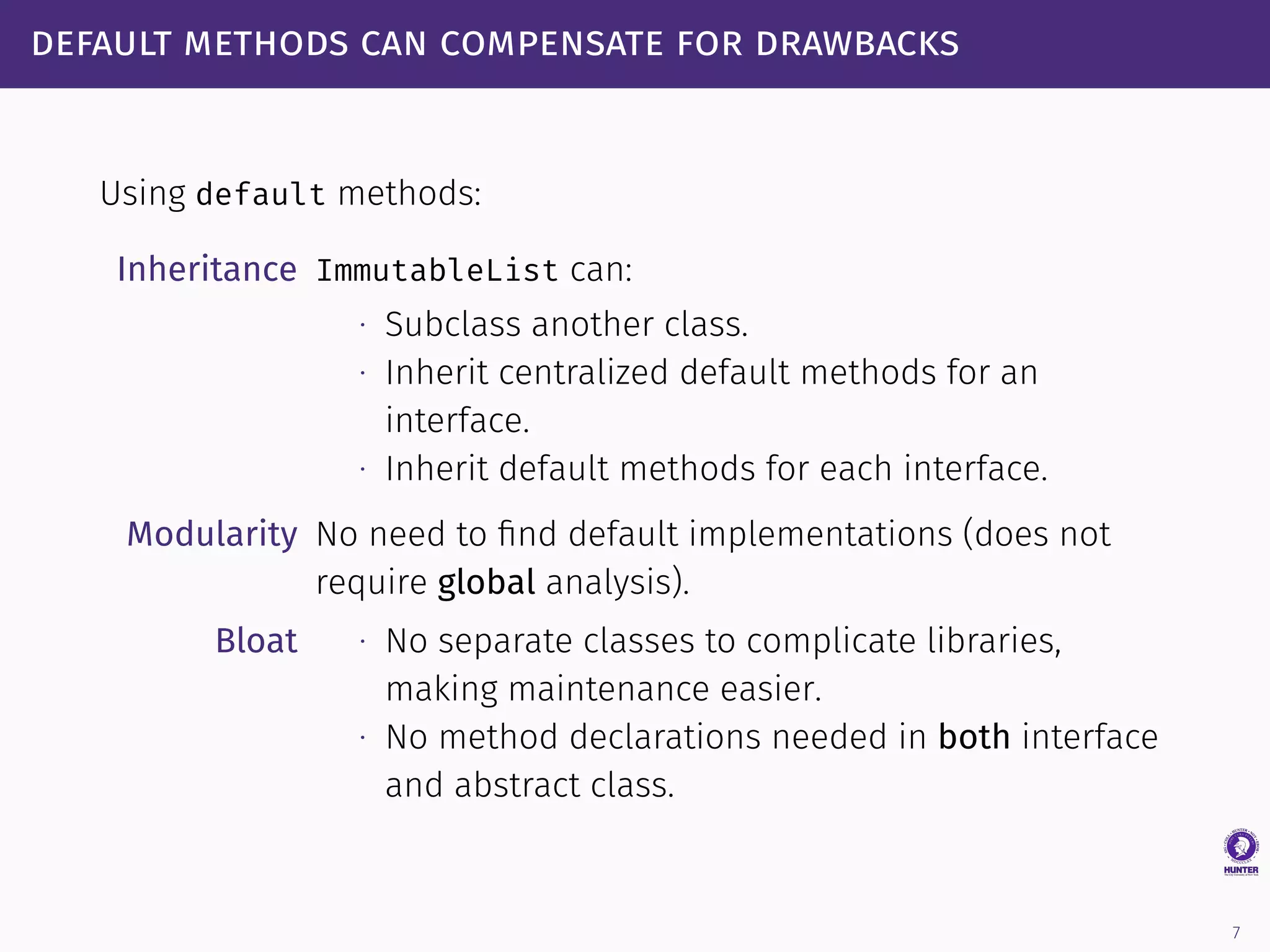
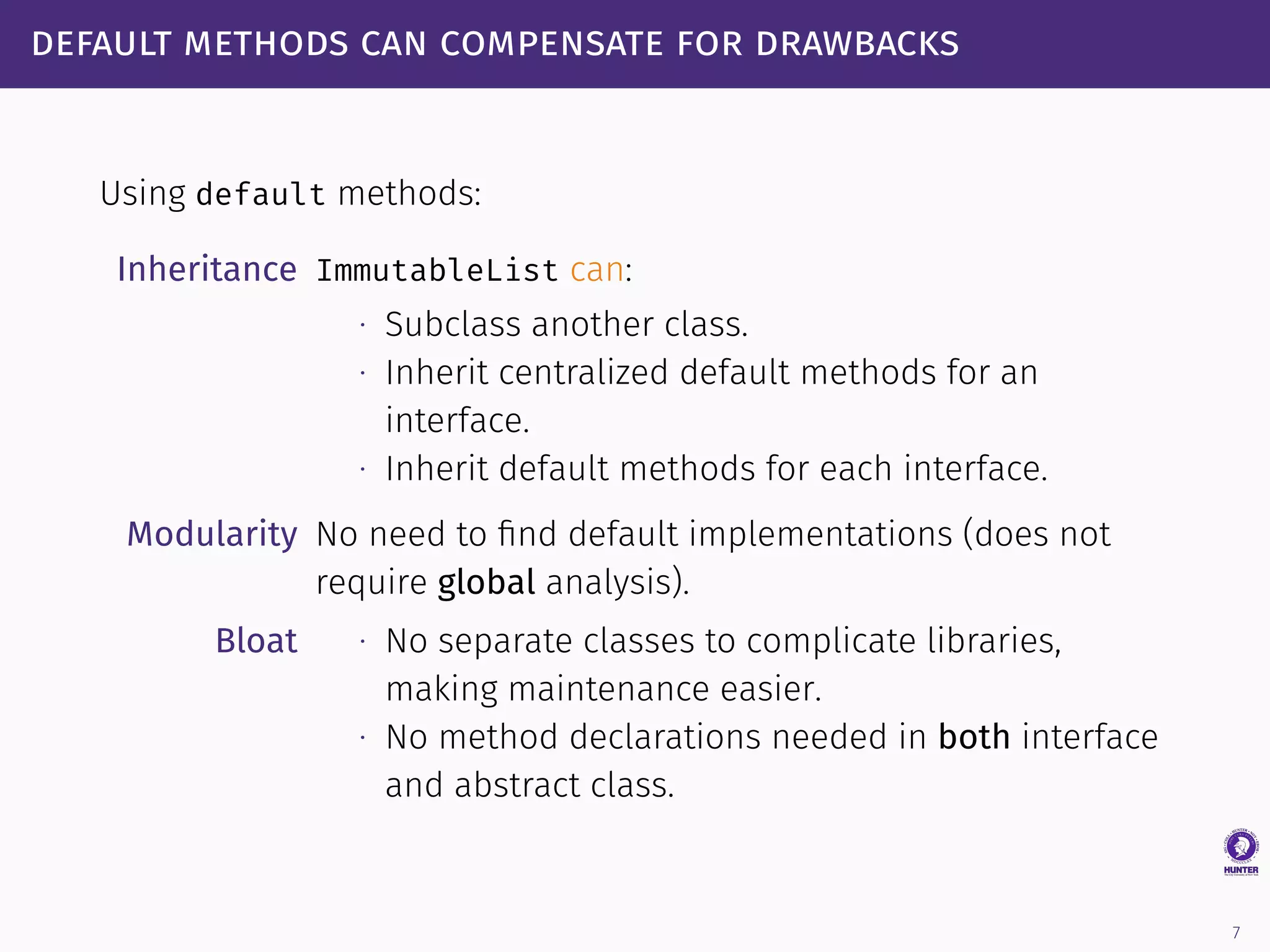
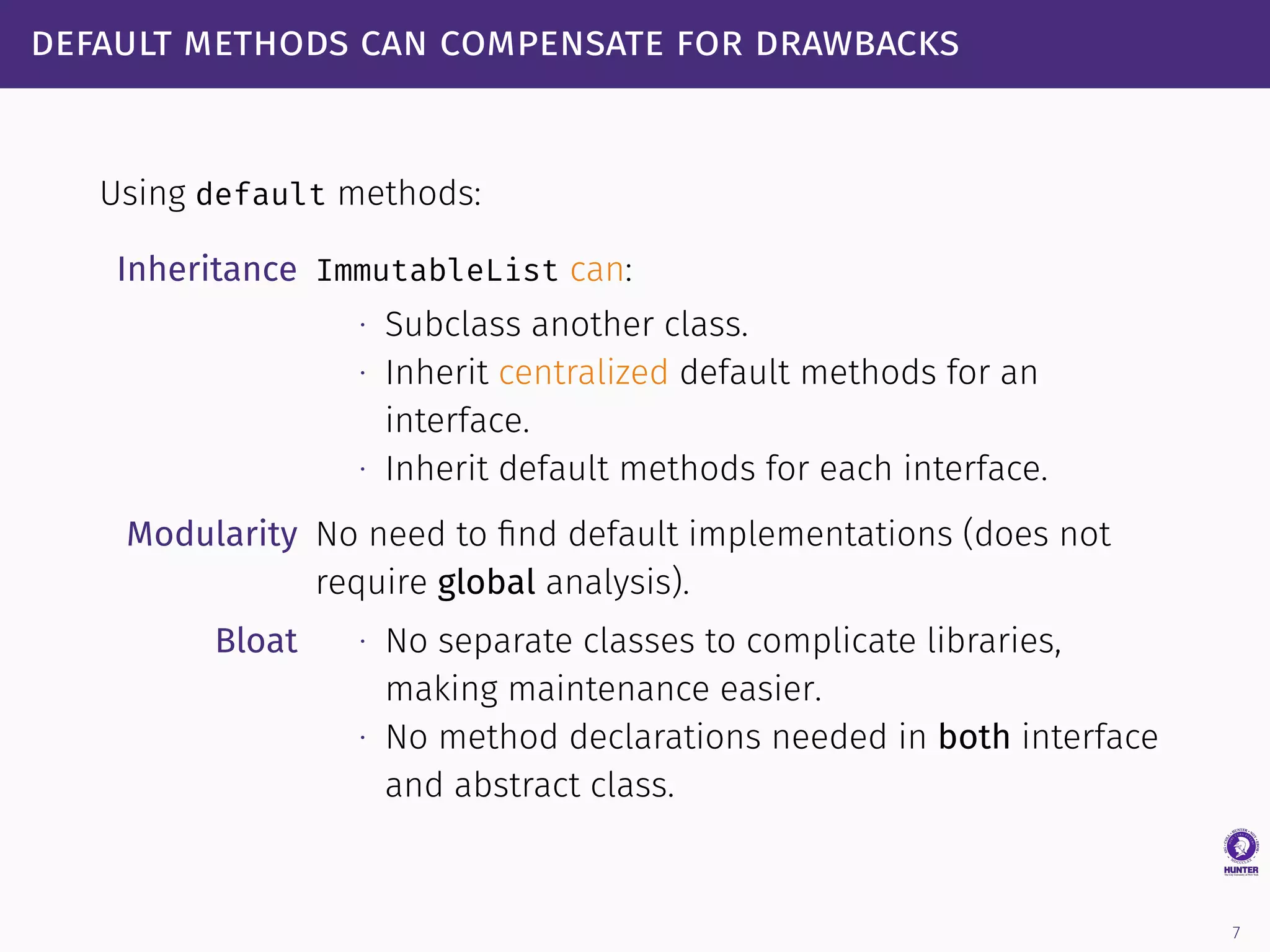
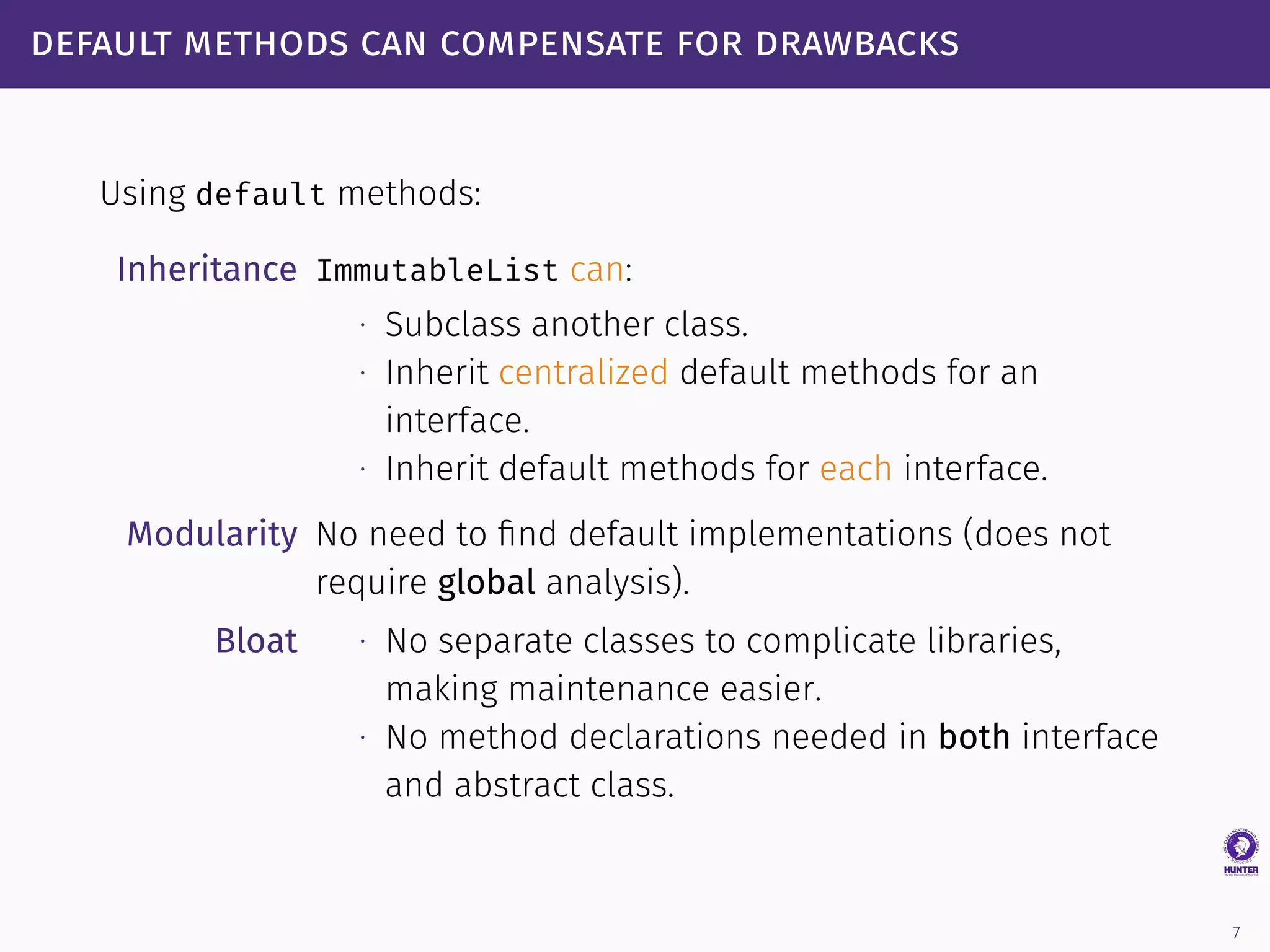
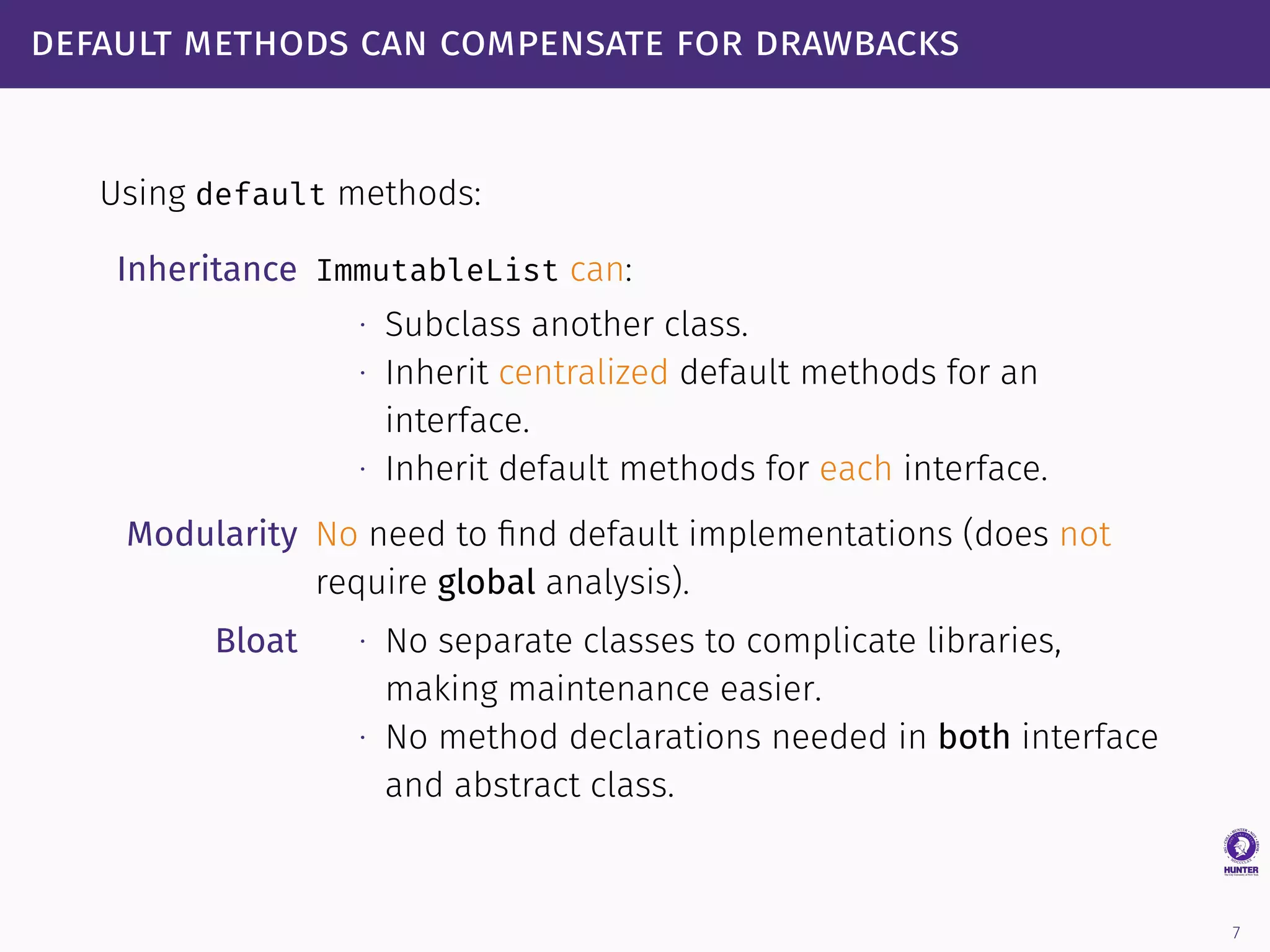
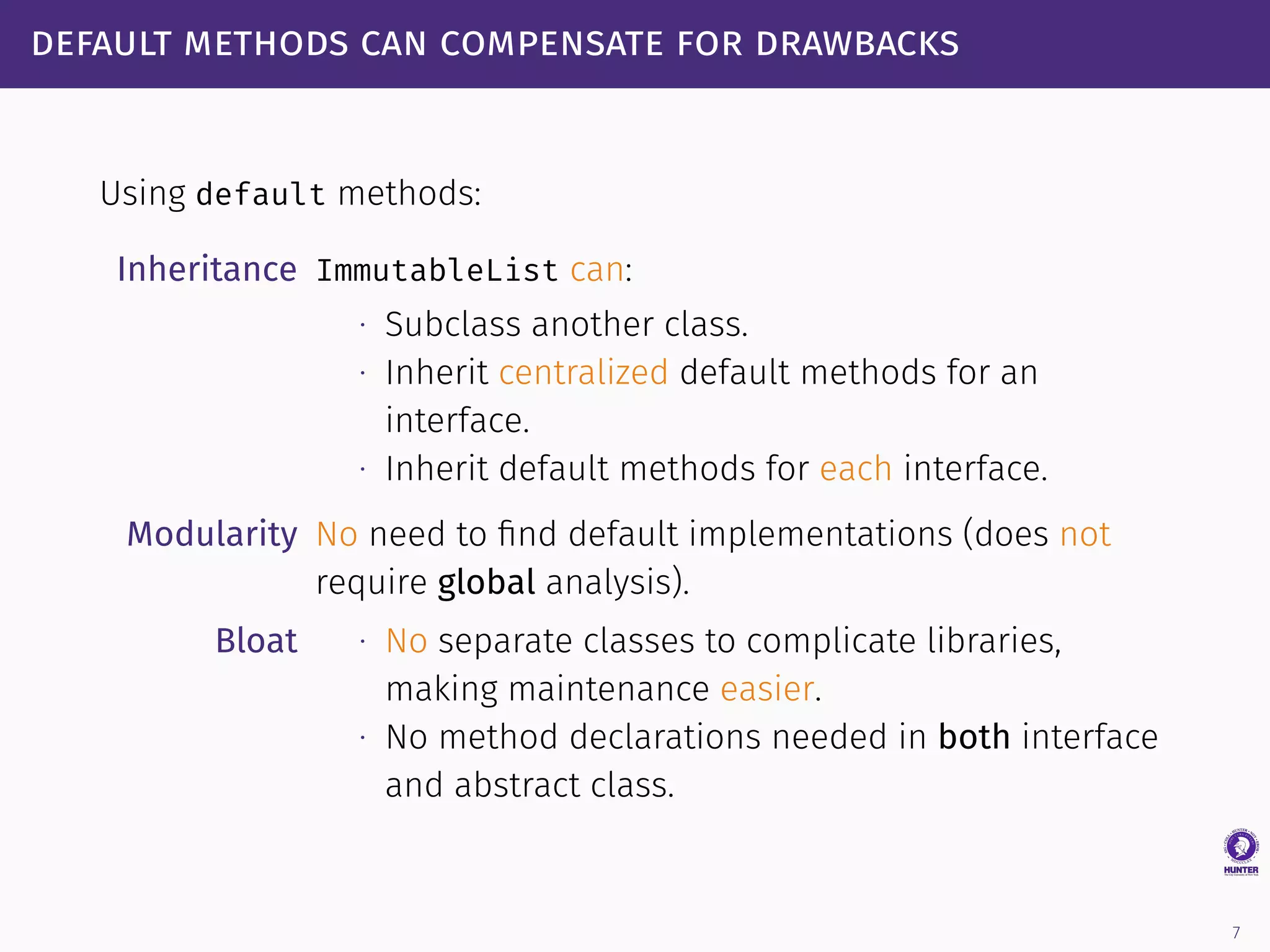
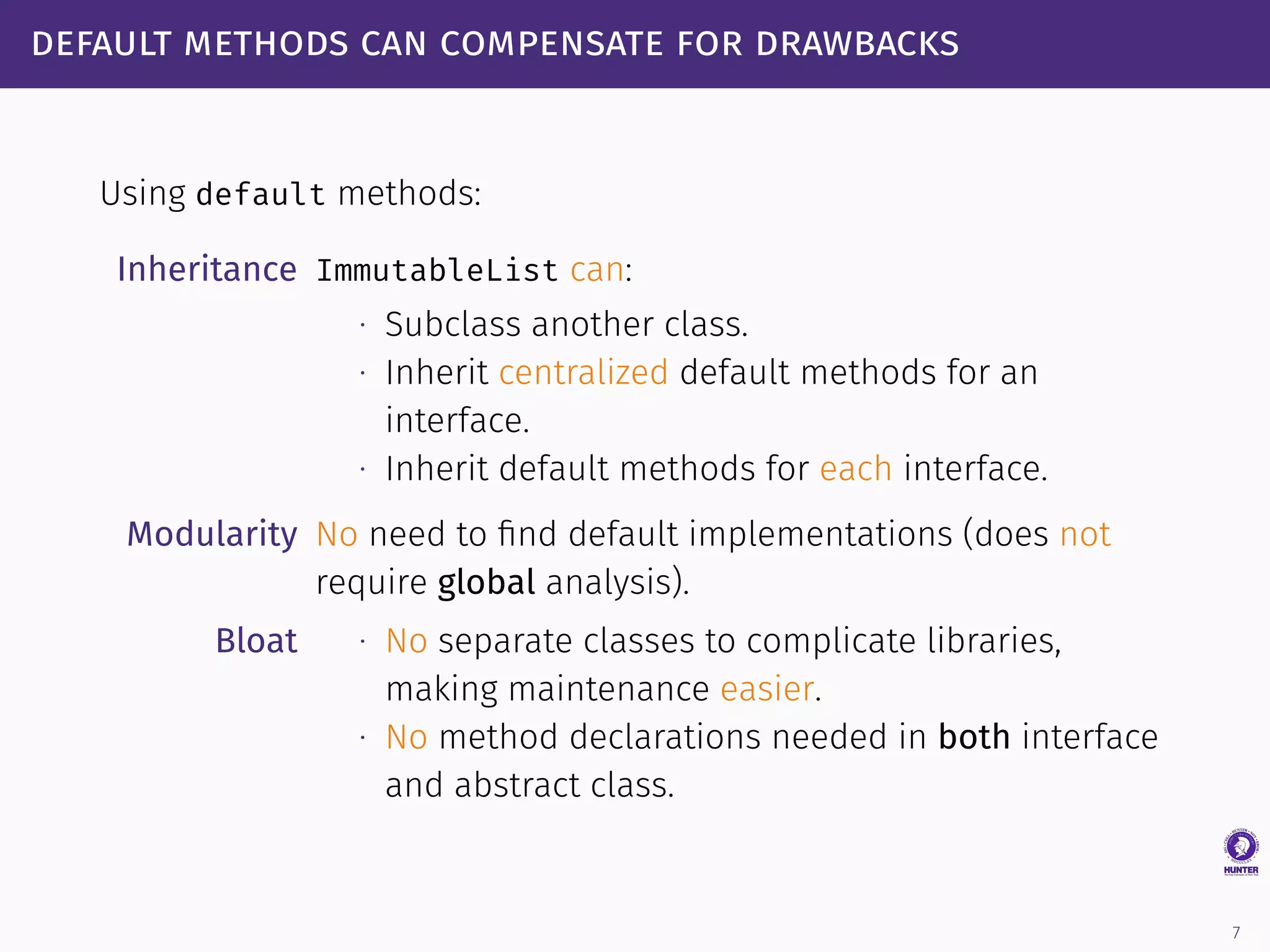
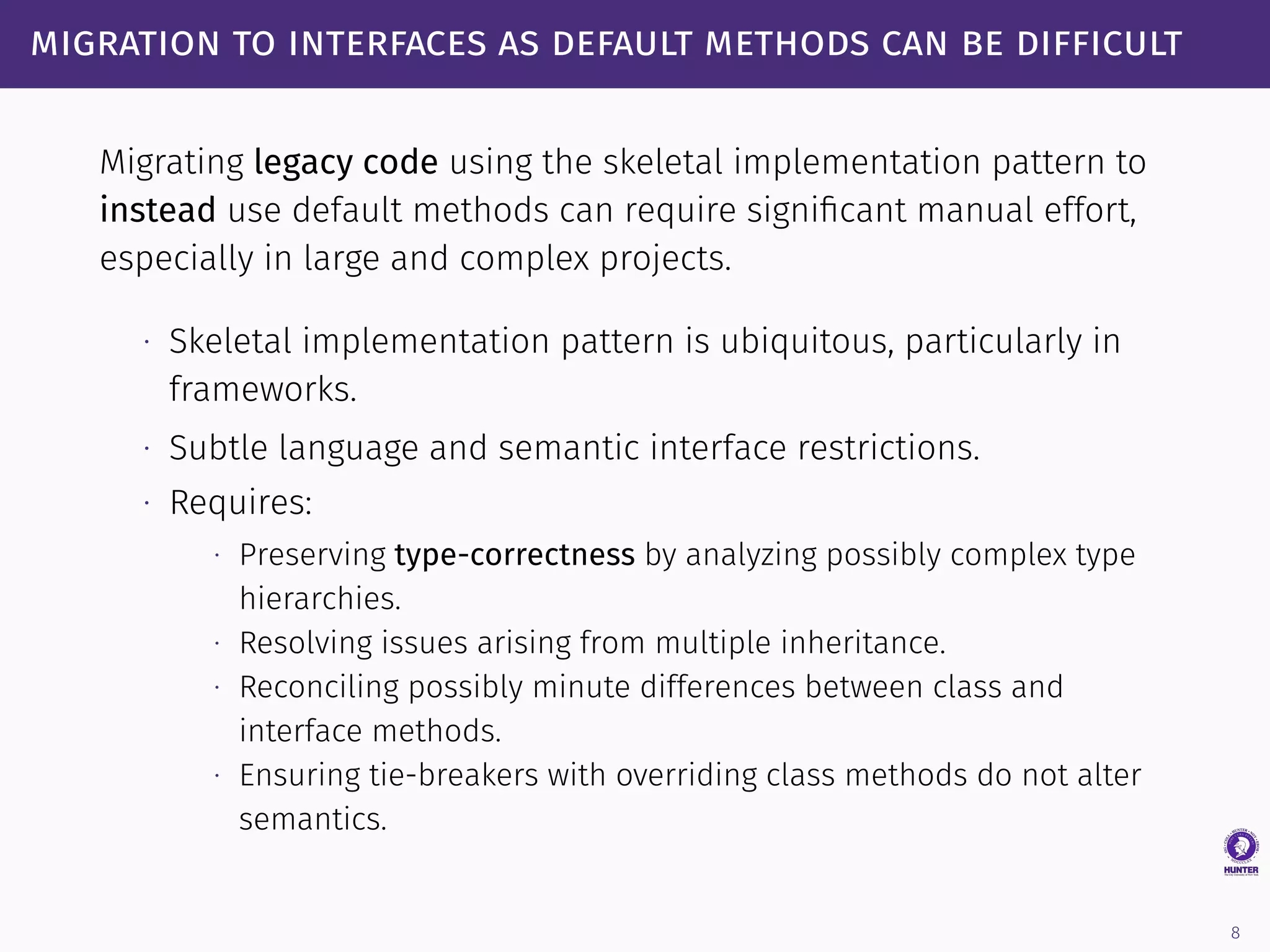
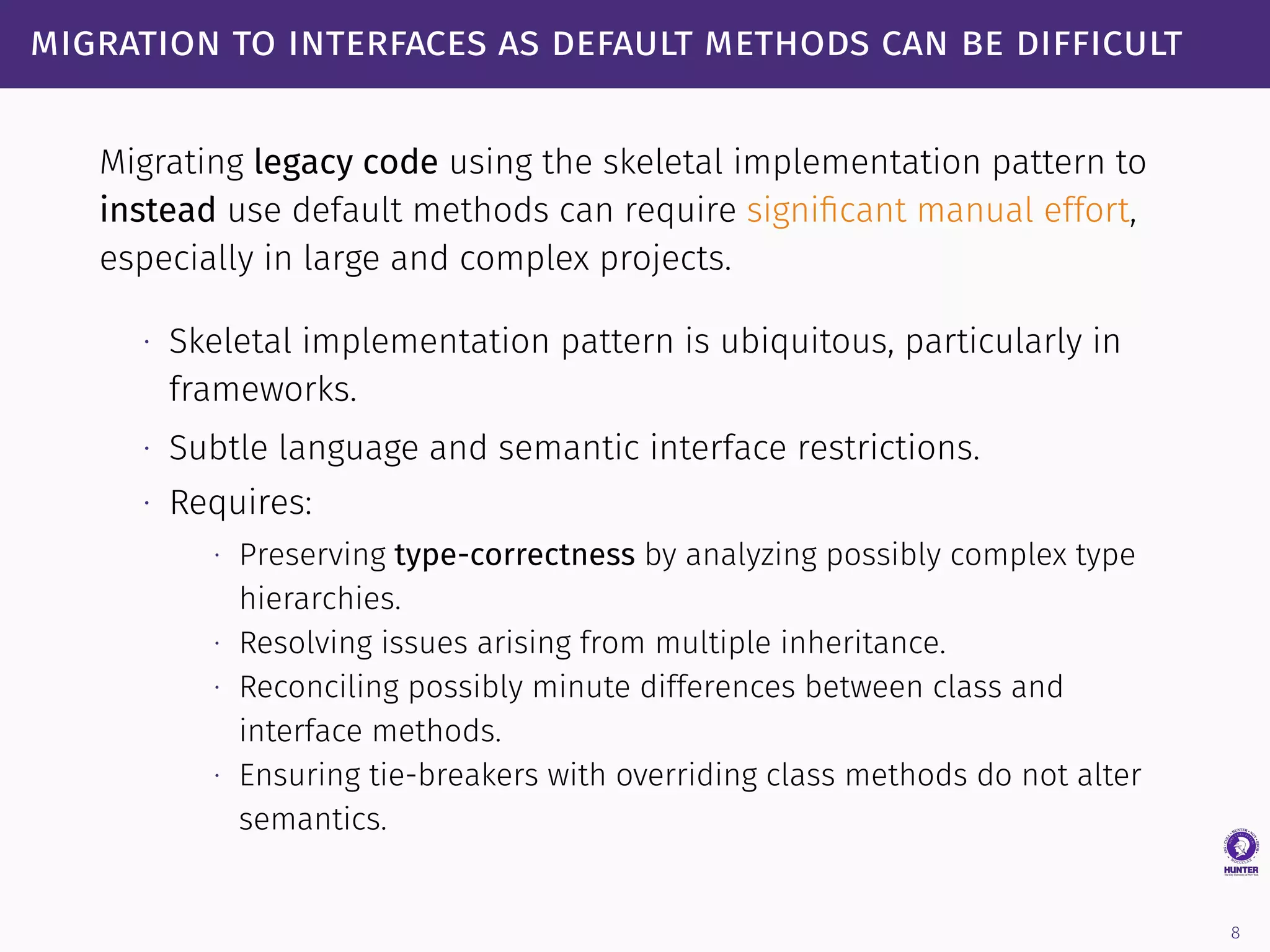
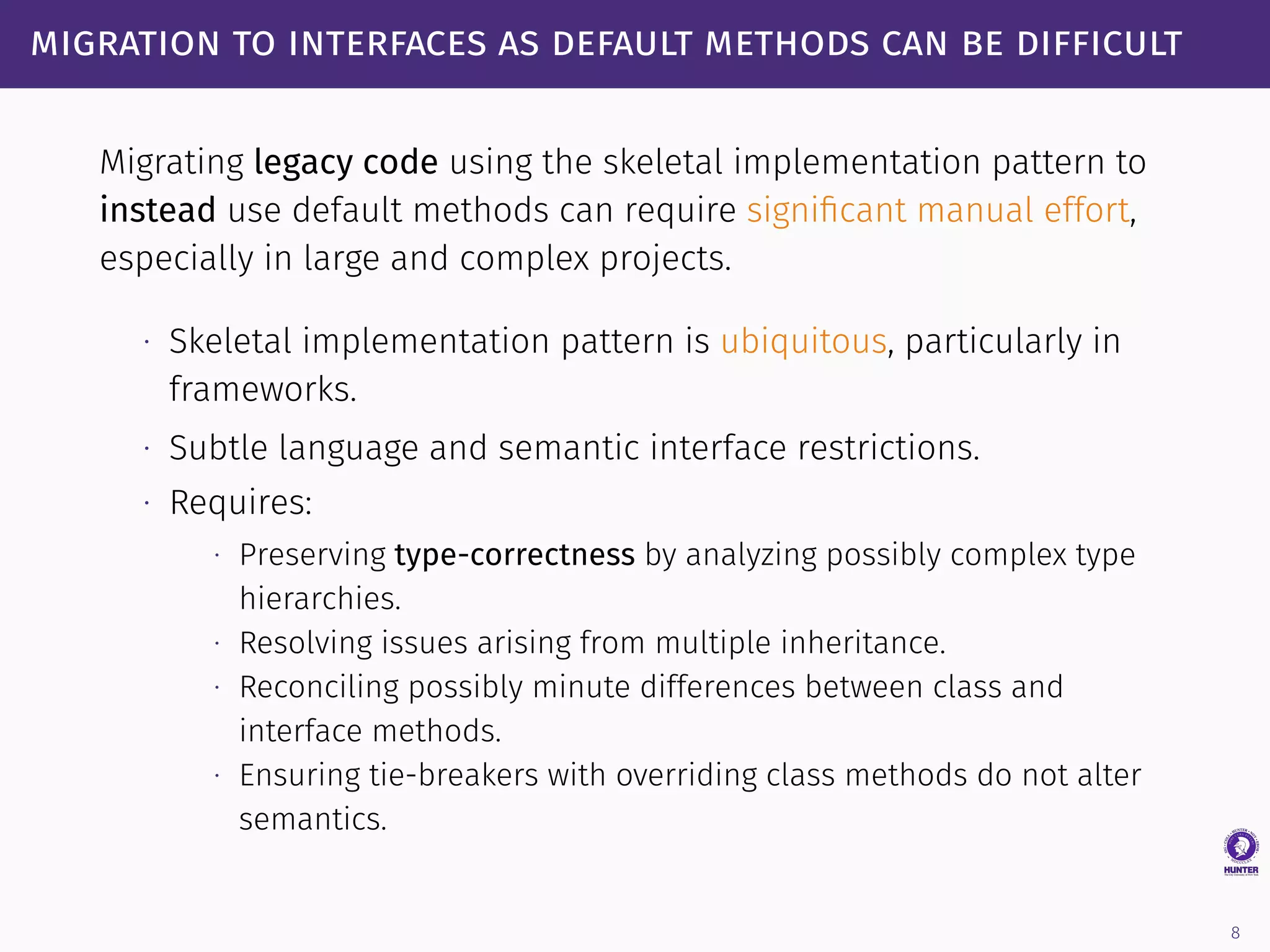
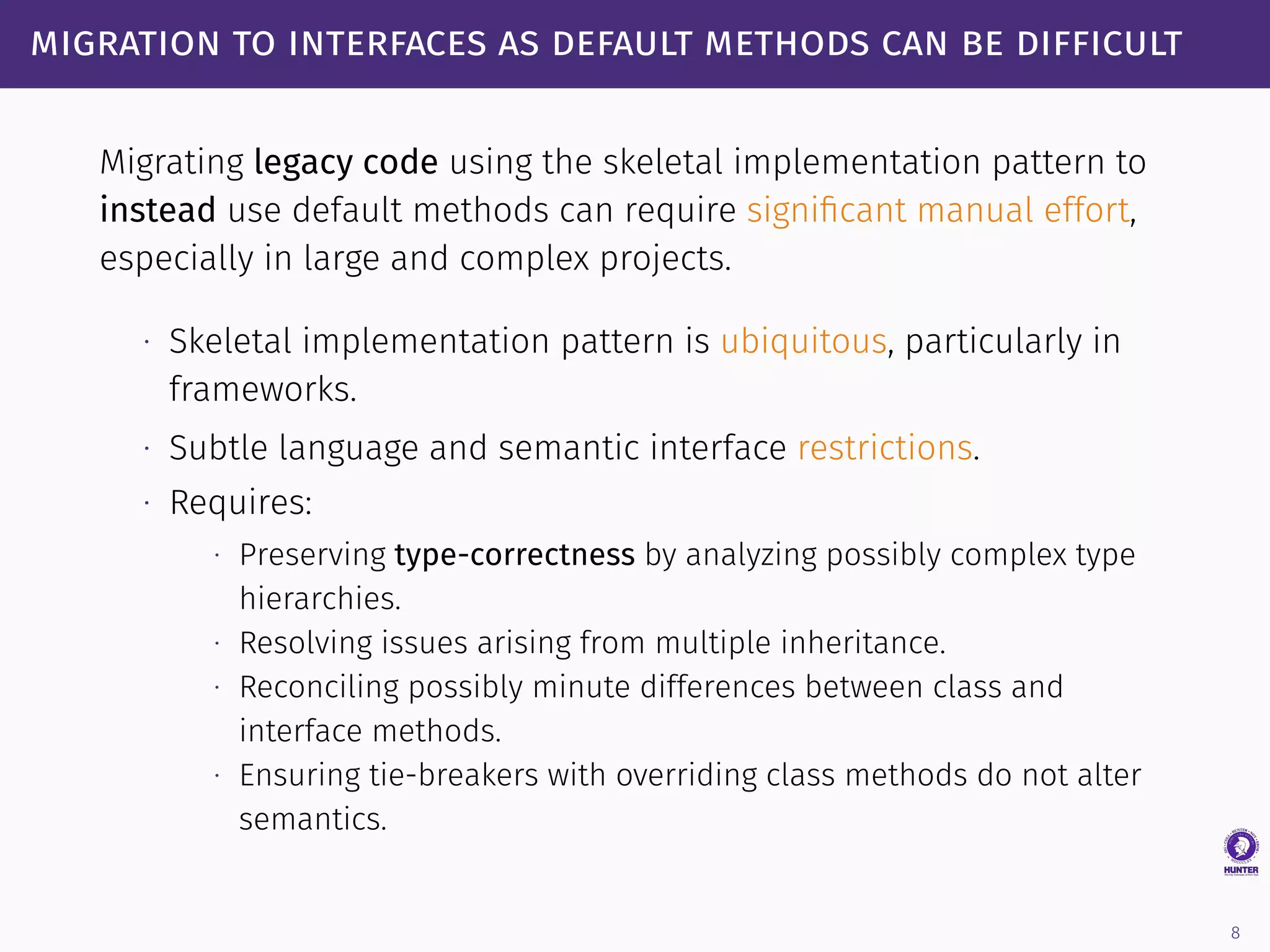
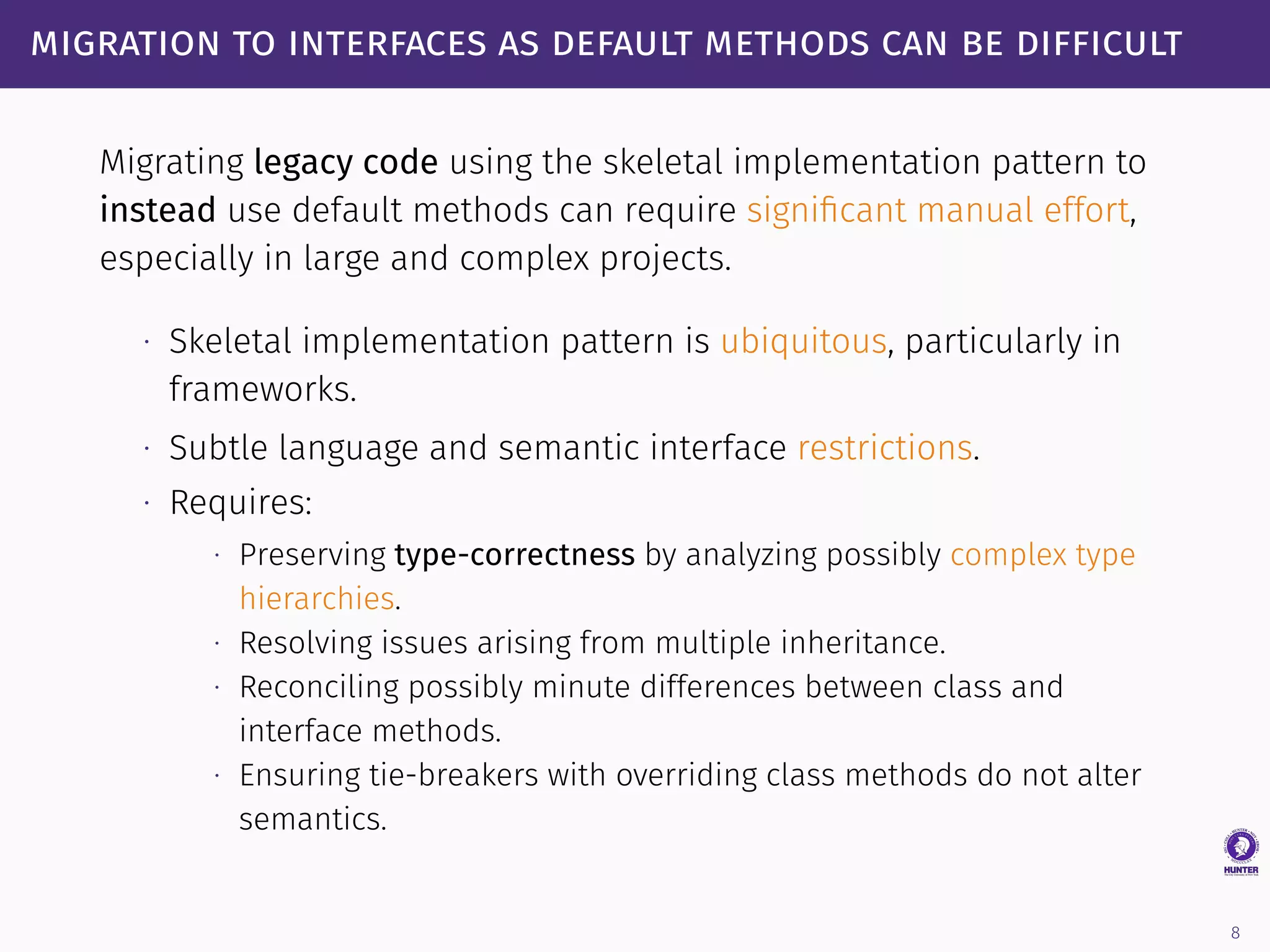
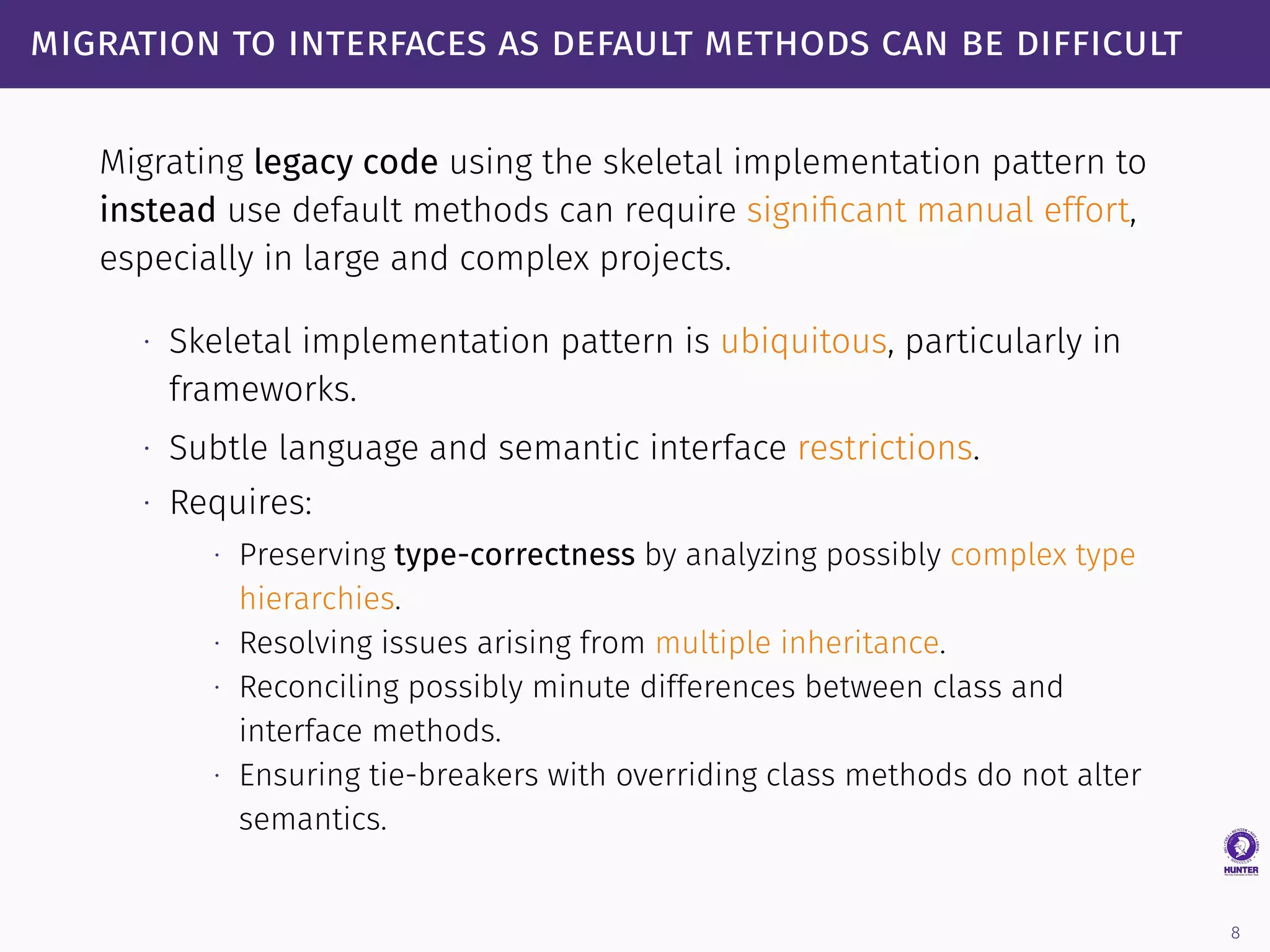
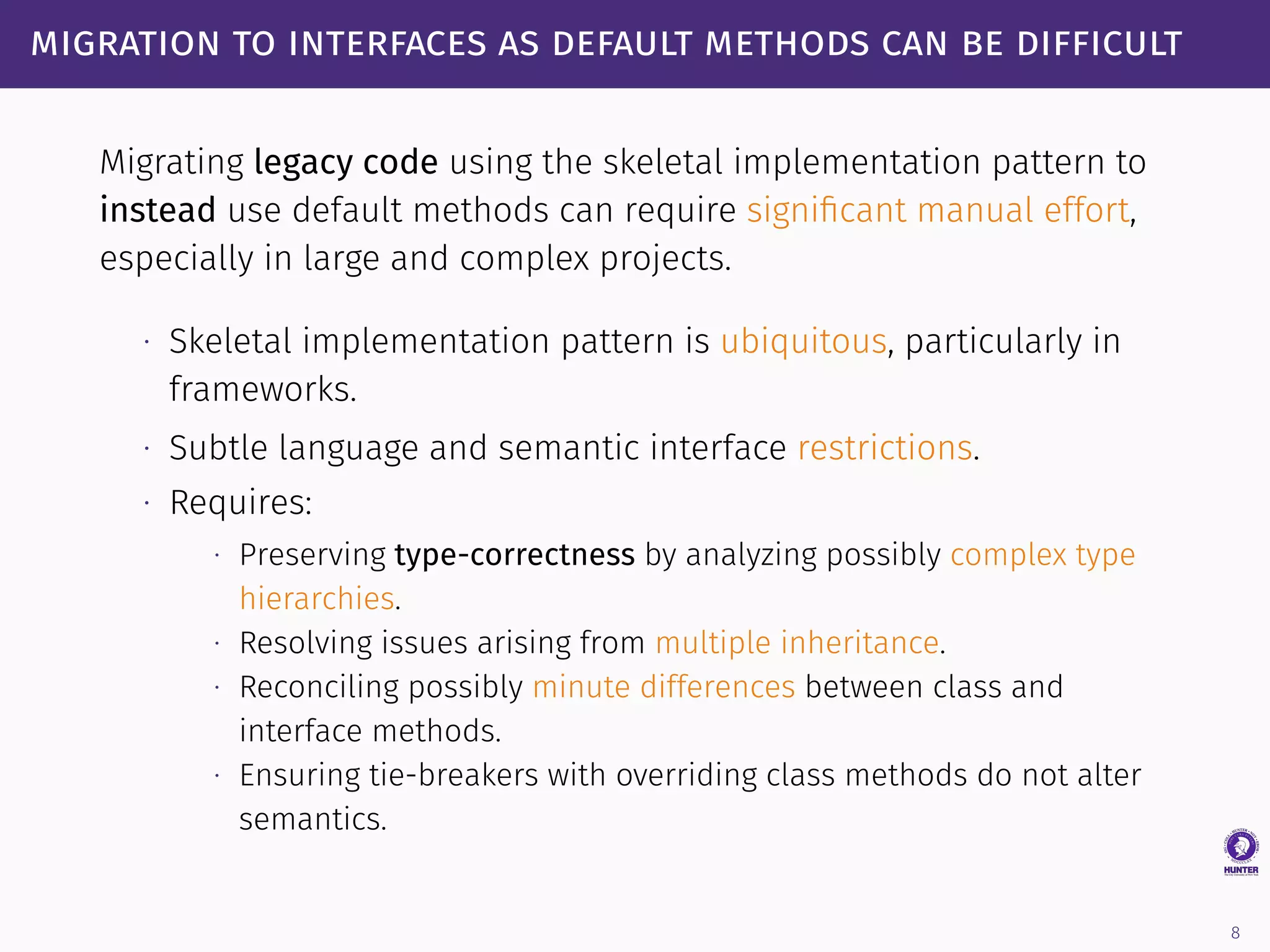
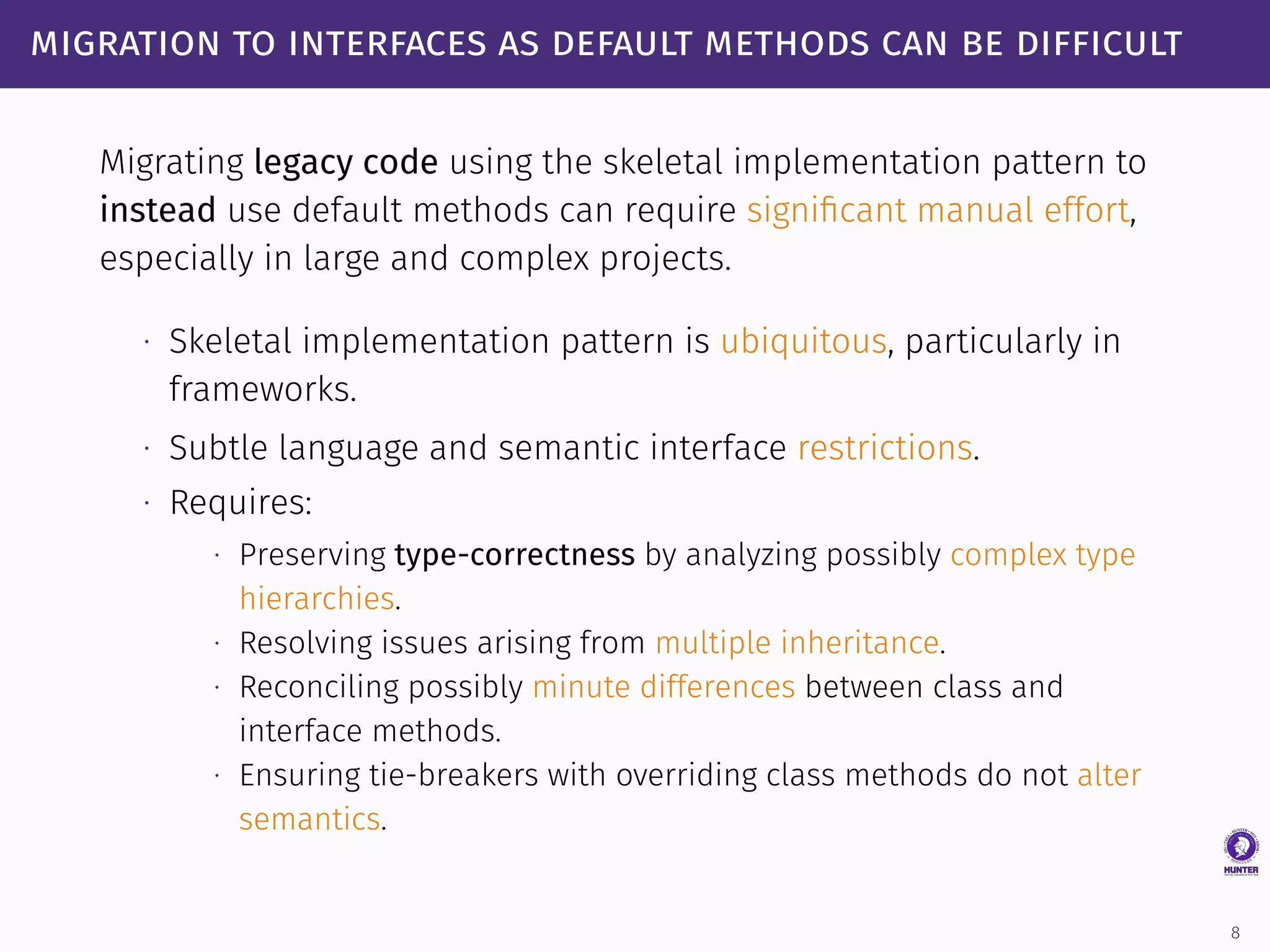
![pull up method refactoring not directly applicable ∙ Pull Up Method refactoring [Fowler, 1999; Tip et al., 2011] safely moves methods from a subclass into a super class. ∙ Goal is solely to reduce redundant code. ∙ Java has multiple interface inheritance. ∙ More complicated type hierarchy involving interfaces. ∙ “Competition” with classes (tie-breaking). ∙ Differences between class method headers (sources) and corresponding interface method declarations (targets). 9](https://image.slidesharecdn.com/paper-170524211242/75/Automated-Refactoring-of-Legacy-Java-Software-to-Default-Methods-Talk-at-ICSE-2017-31-2048.jpg)
![move original method to super class does not deal with bodies ∙ “Move Original Method to Super Class” law [Borba et al., 2004] expresses transformational semantic equivalence. ∙ In our case, no method declarations are being moved but rather bodies. 10](https://image.slidesharecdn.com/paper-170524211242/75/Automated-Refactoring-of-Legacy-Java-Software-to-Default-Methods-Talk-at-ICSE-2017-32-2048.jpg)

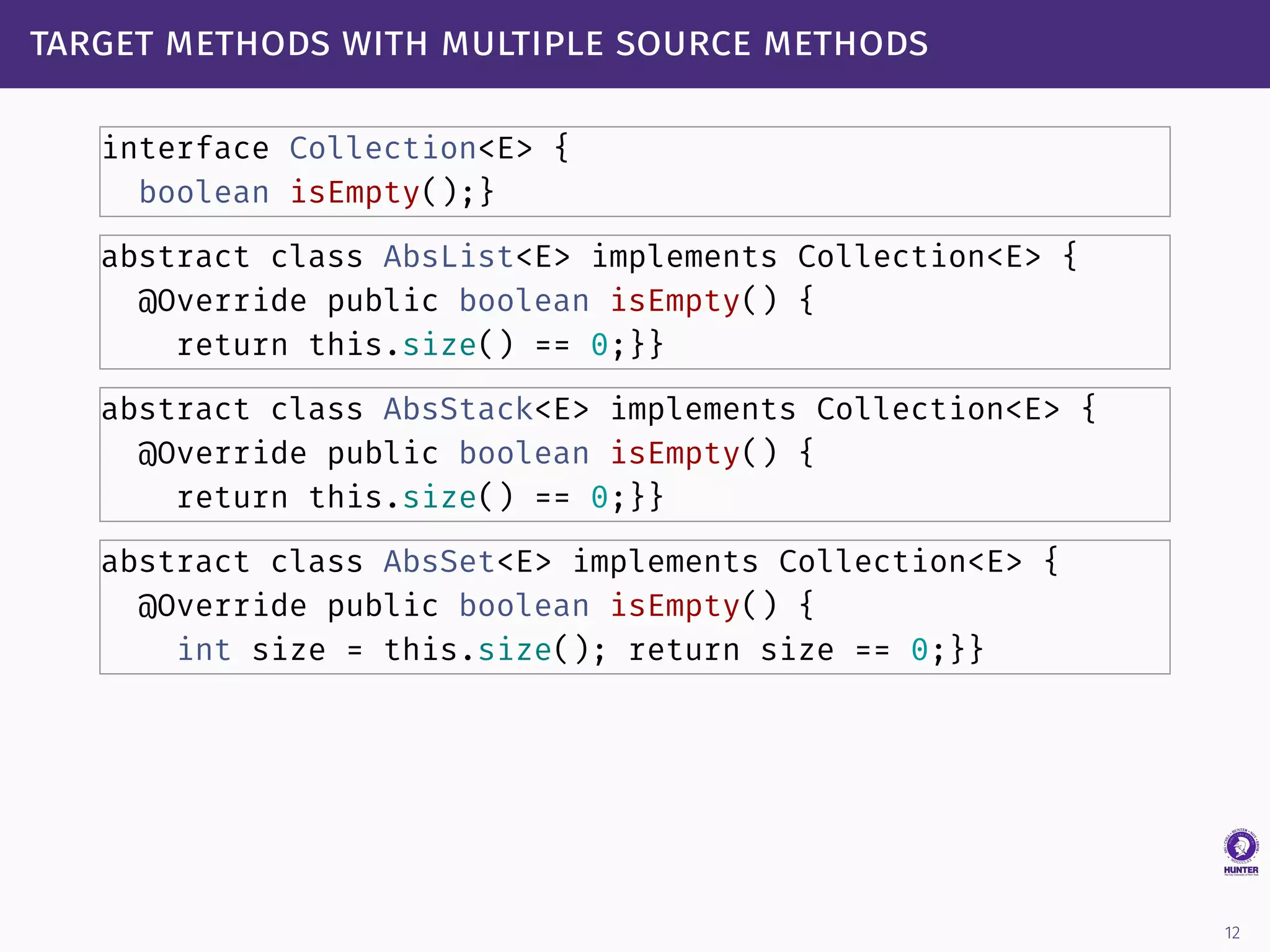
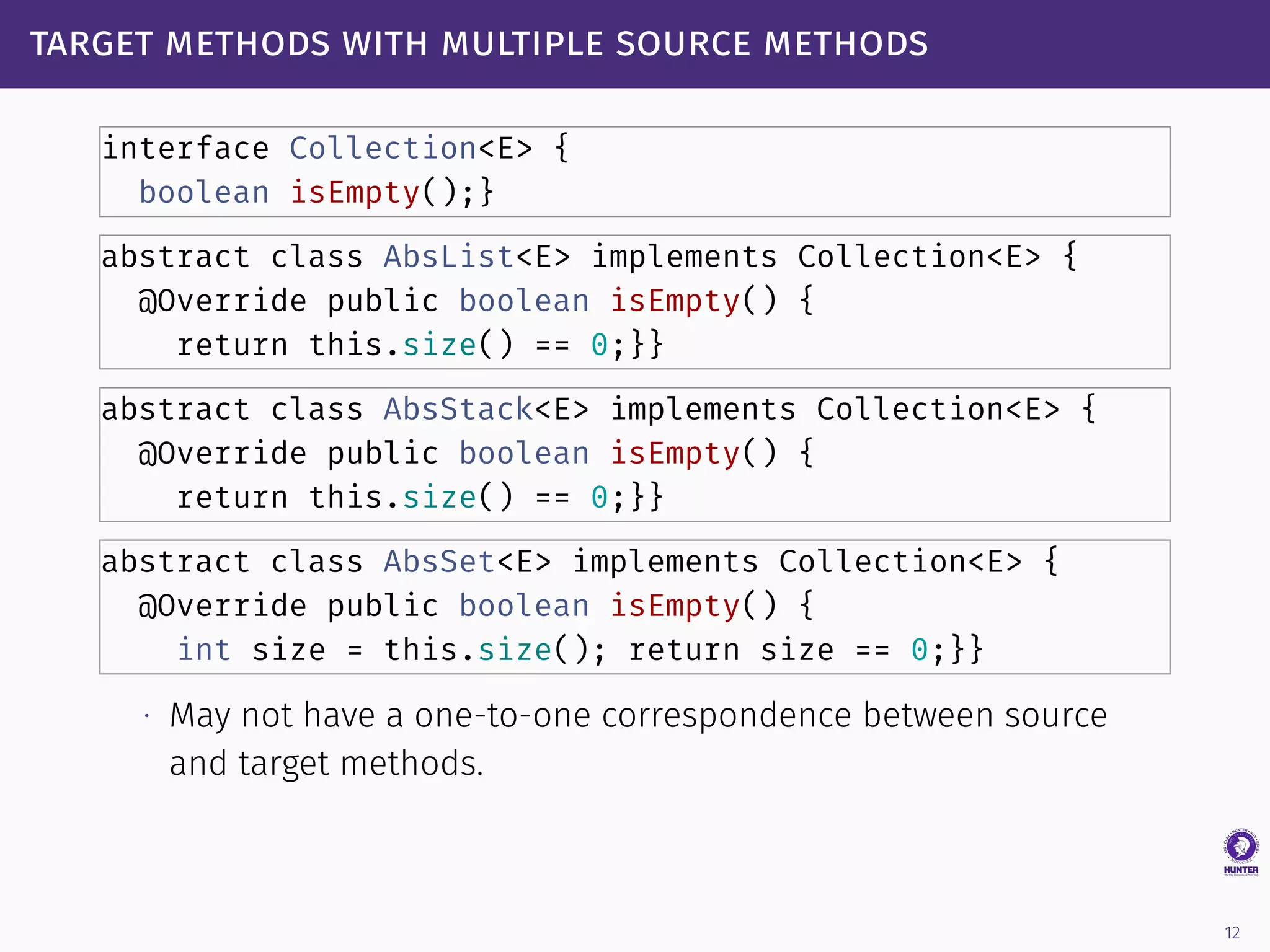
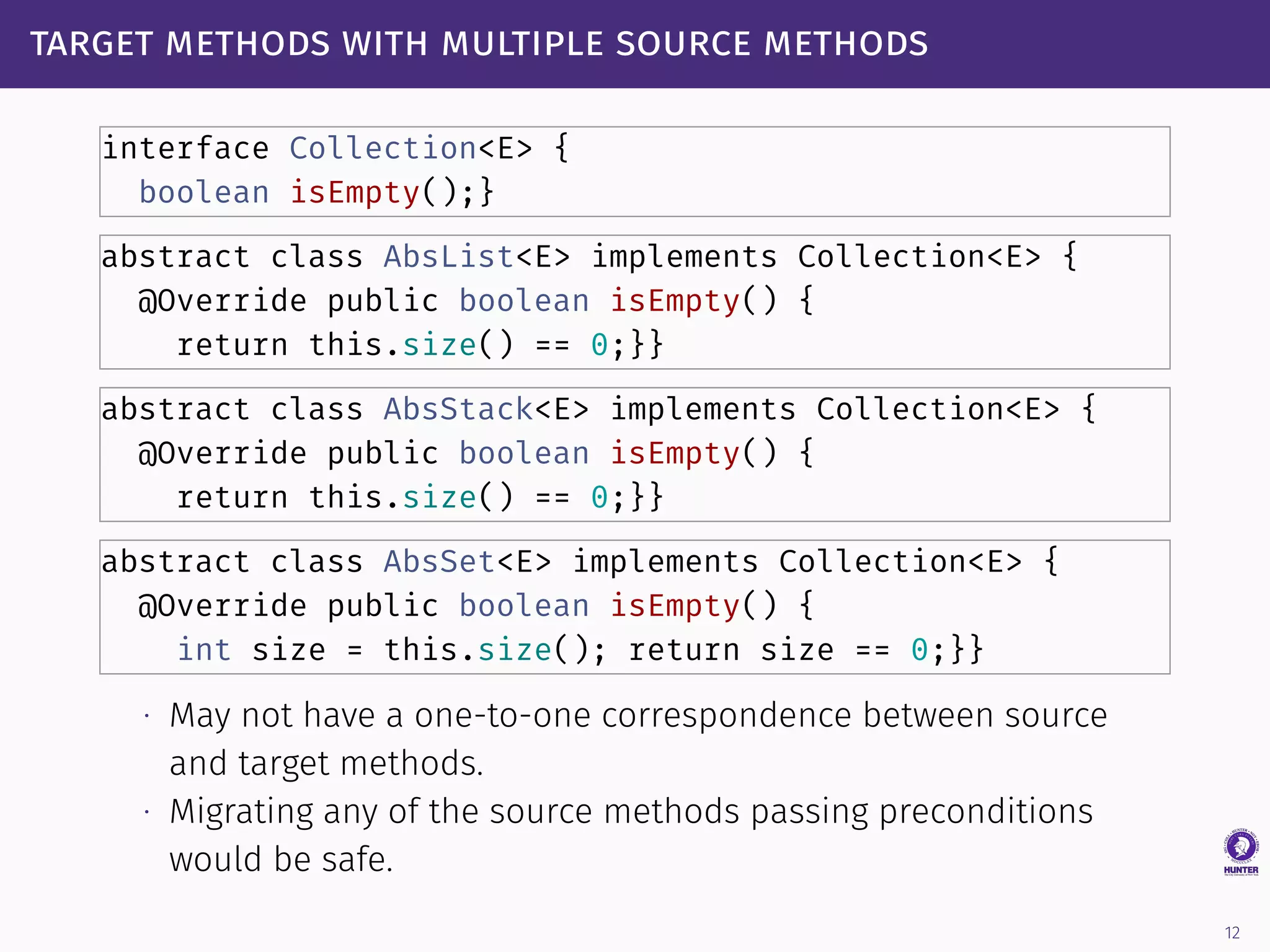
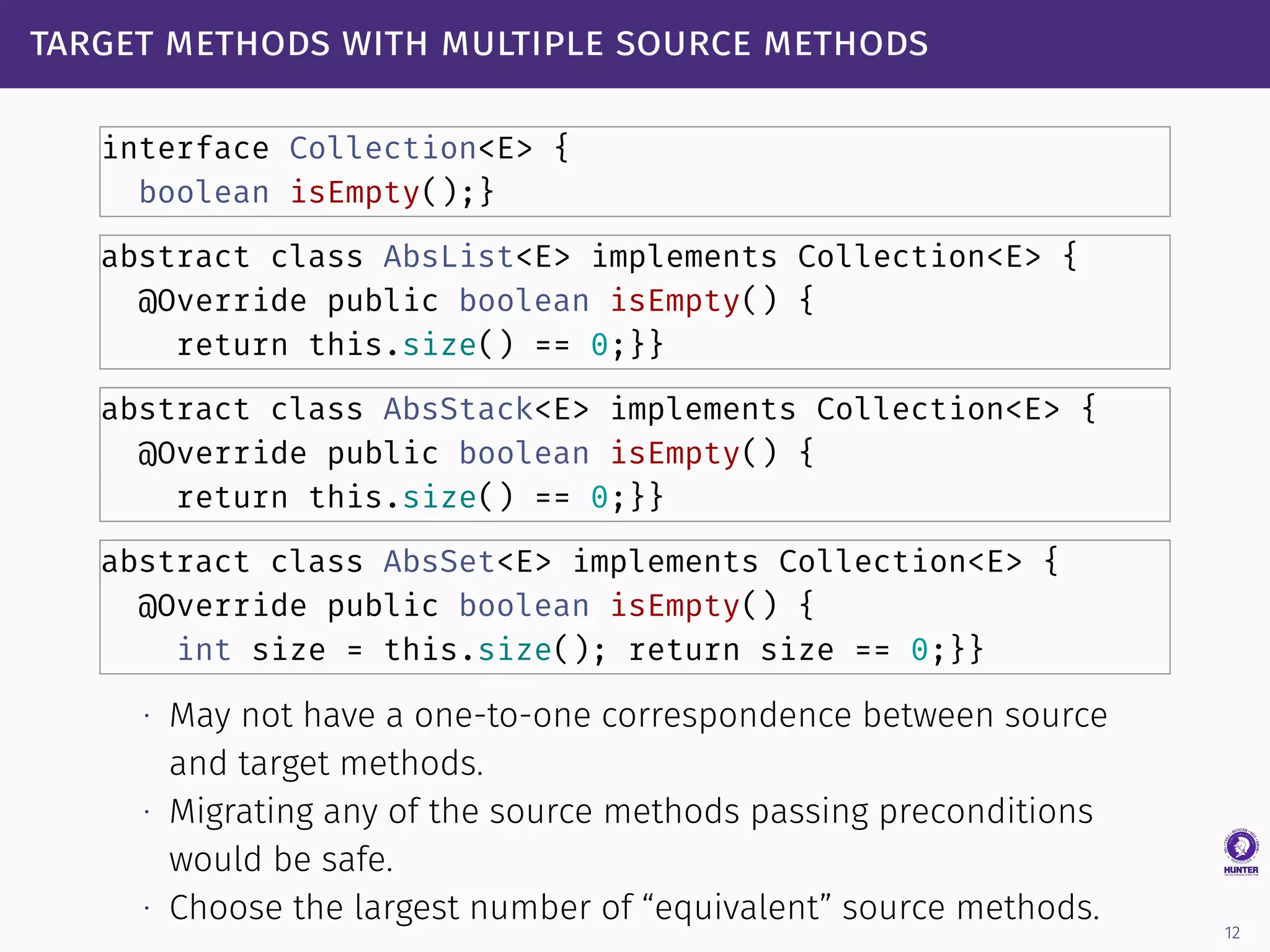
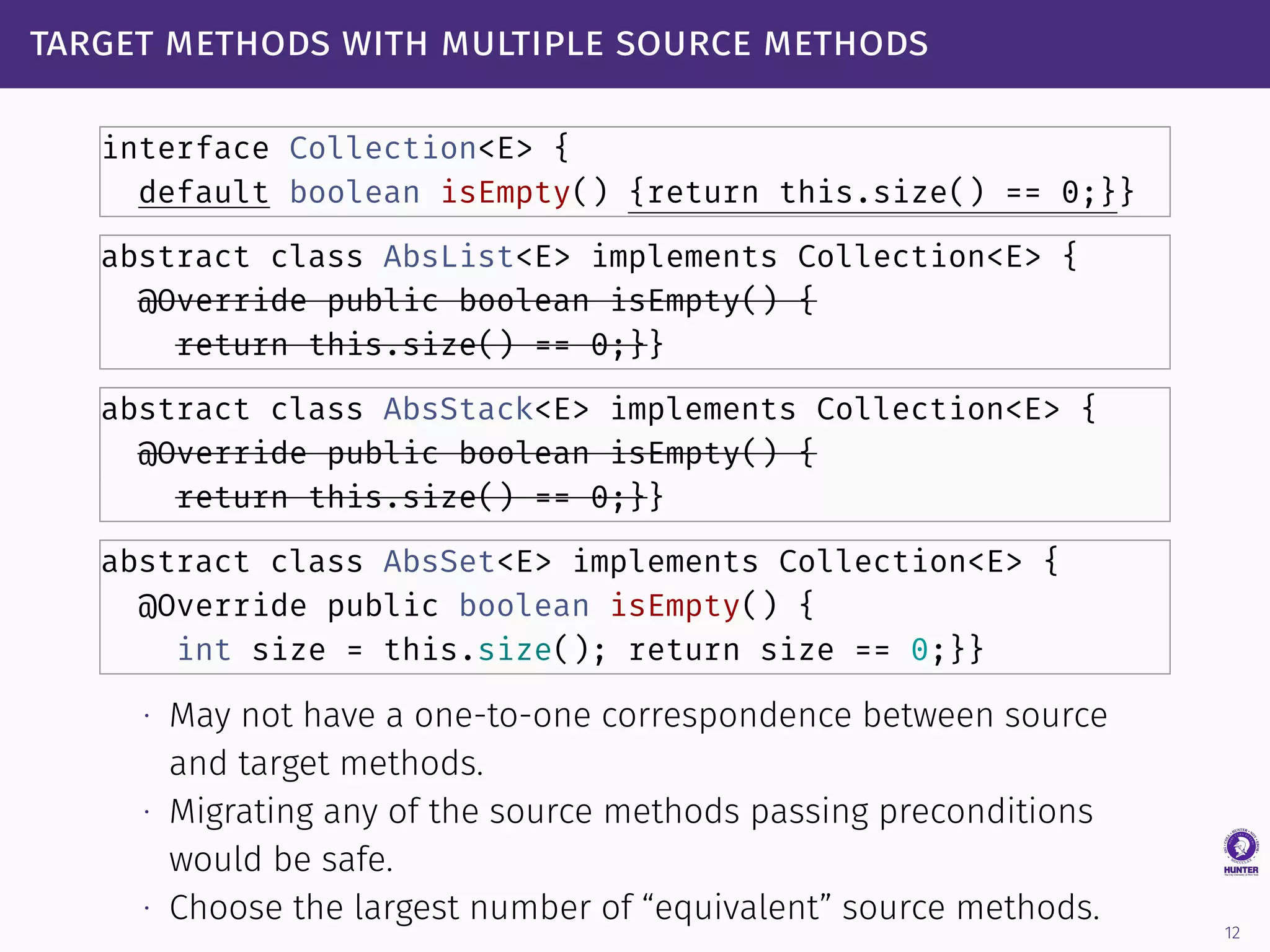
![interfaces cannot declare instance fields interface Collection<E> { int size();} abstract class AbsList<E> implements Collection<E> { Object[] elems; int size; @Override public int size() {return this.size;}} ∙ Migrate AbsList.size() to Collection as a default method? 13](https://image.slidesharecdn.com/paper-170524211242/75/Automated-Refactoring-of-Legacy-Java-Software-to-Default-Methods-Talk-at-ICSE-2017-39-2048.jpg)
![interfaces cannot declare instance fields interface Collection<E> { default int size() {return this.size;}} abstract class AbsList<E> implements Collection<E> { Object[] elems; int size; @Override public int size() {return this.size;}} ∙ Migrate AbsList.size() to Collection as a default method? 13](https://image.slidesharecdn.com/paper-170524211242/75/Automated-Refactoring-of-Legacy-Java-Software-to-Default-Methods-Talk-at-ICSE-2017-40-2048.jpg)
![interfaces cannot declare instance fields interface Collection<E> { default int size() {return this.size;}} abstract class AbsList<E> implements Collection<E> { Object[] elems; int size; @Override public int size() {return this.size;}} ∙ Migrate AbsList.size() to Collection as a default method? ∙ size() accesses instance fields; migrate them to Collection? 13](https://image.slidesharecdn.com/paper-170524211242/75/Automated-Refactoring-of-Legacy-Java-Software-to-Default-Methods-Talk-at-ICSE-2017-41-2048.jpg)
![interfaces cannot declare instance fields interface Collection<E> { Object[] elems; int size; default int size() {return this.size;}} abstract class AbsList<E> implements Collection<E> { Object[] elems; int size; @Override public int size() {return this.size;}} ∙ Migrate AbsList.size() to Collection as a default method? ∙ size() accesses instance fields; migrate them to Collection? 13](https://image.slidesharecdn.com/paper-170524211242/75/Automated-Refactoring-of-Legacy-Java-Software-to-Default-Methods-Talk-at-ICSE-2017-42-2048.jpg)
![interfaces cannot declare instance fields interface Collection<E> { Object[] elems; int size; default int size() {return this.size;}} abstract class AbsList<E> implements Collection<E> { Object[] elems; int size; @Override public int size() {return this.size;}} ∙ Migrate AbsList.size() to Collection as a default method? ∙ size() accesses instance fields; migrate them to Collection? ∙ Interfaces cannot declare instance fields. 13](https://image.slidesharecdn.com/paper-170524211242/75/Automated-Refactoring-of-Legacy-Java-Software-to-Default-Methods-Talk-at-ICSE-2017-43-2048.jpg)
![interfaces cannot declare instance fields interface Collection<E> { Object[] elems; int size; default int size() {return this.size;}} abstract class AbsList<E> implements Collection<E> { Object[] elems; int size; @Override public int size() {return this.size;}} ∙ Migrate AbsList.size() to Collection as a default method? ∙ size() accesses instance fields; migrate them to Collection? ∙ Interfaces cannot declare instance fields. 13](https://image.slidesharecdn.com/paper-170524211242/75/Automated-Refactoring-of-Legacy-Java-Software-to-Default-Methods-Talk-at-ICSE-2017-44-2048.jpg)
![interfaces cannot declare instance fields interface Collection<E> { Object[] elems; int size; default int size() {return this.size;}} abstract class AbsList<E> implements Collection<E> { Object[] elems; int size; @Override public int size() {return this.size;}} ∙ Migrate AbsList.size() to Collection as a default method? ∙ size() accesses instance fields; migrate them to Collection? ∙ Interfaces cannot declare instance fields. Question In general, how can we guarantee that migration results in a type-correct transformation? 13](https://image.slidesharecdn.com/paper-170524211242/75/Automated-Refactoring-of-Legacy-Java-Software-to-Default-Methods-Talk-at-ICSE-2017-45-2048.jpg)
![interfaces cannot declare instance fields interface Collection<E> { Object[] elems; int size; default int size() {return this.size;}} abstract class AbsList<E> implements Collection<E> { Object[] elems; int size; @Override public int size() {return this.size;}} ∙ Migrate AbsList.size() to Collection as a default method? ∙ size() accesses instance fields; migrate them to Collection? ∙ Interfaces cannot declare instance fields. Question In general, how can we guarantee that migration results in a type-correct transformation? Answer Use type constraints [Palsberg and Schwartzbach, 1994; Tip et al., 2011] to check refactoring preconditions. 13](https://image.slidesharecdn.com/paper-170524211242/75/Automated-Refactoring-of-Legacy-Java-Software-to-Default-Methods-Talk-at-ICSE-2017-46-2048.jpg)
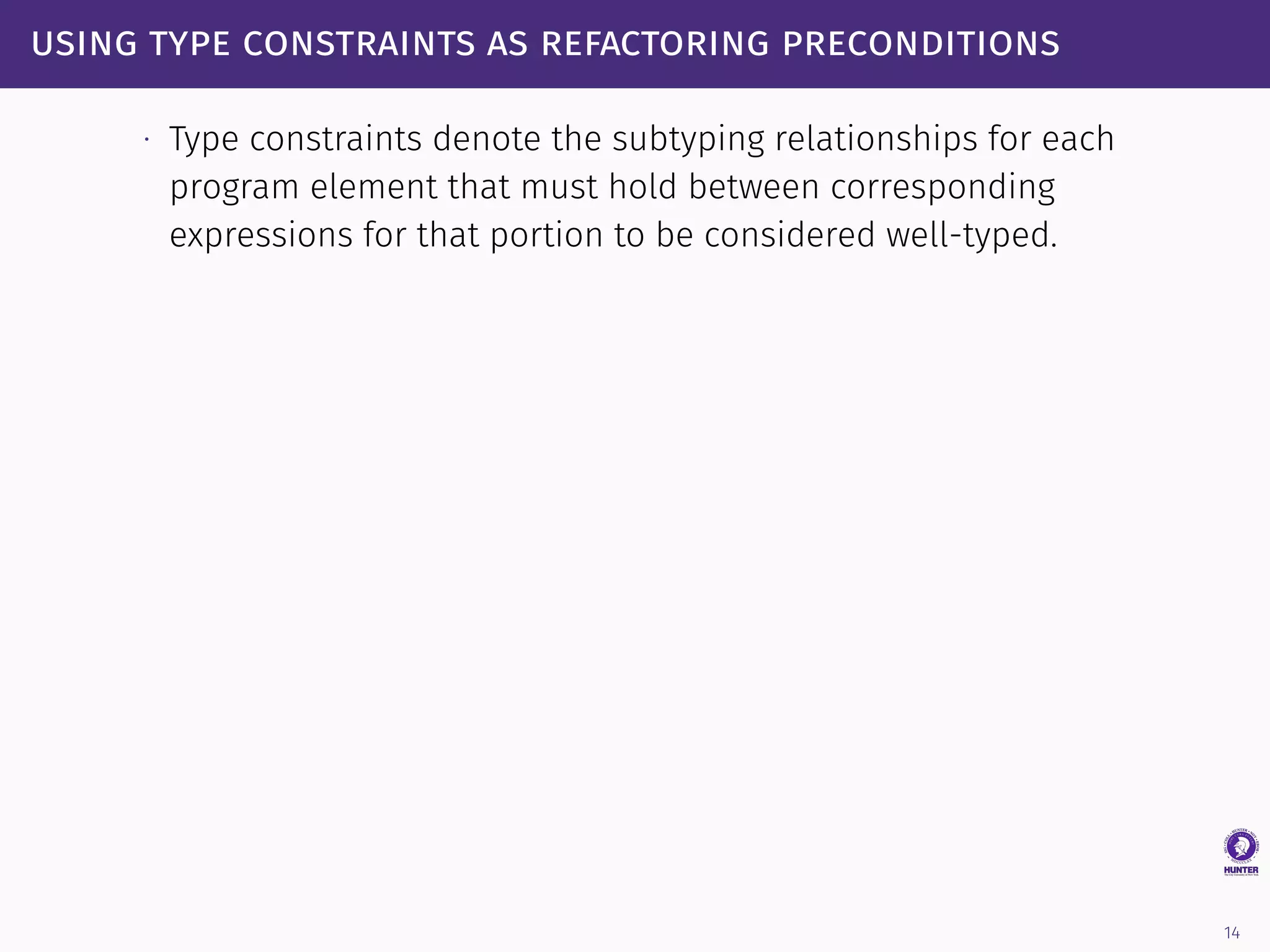
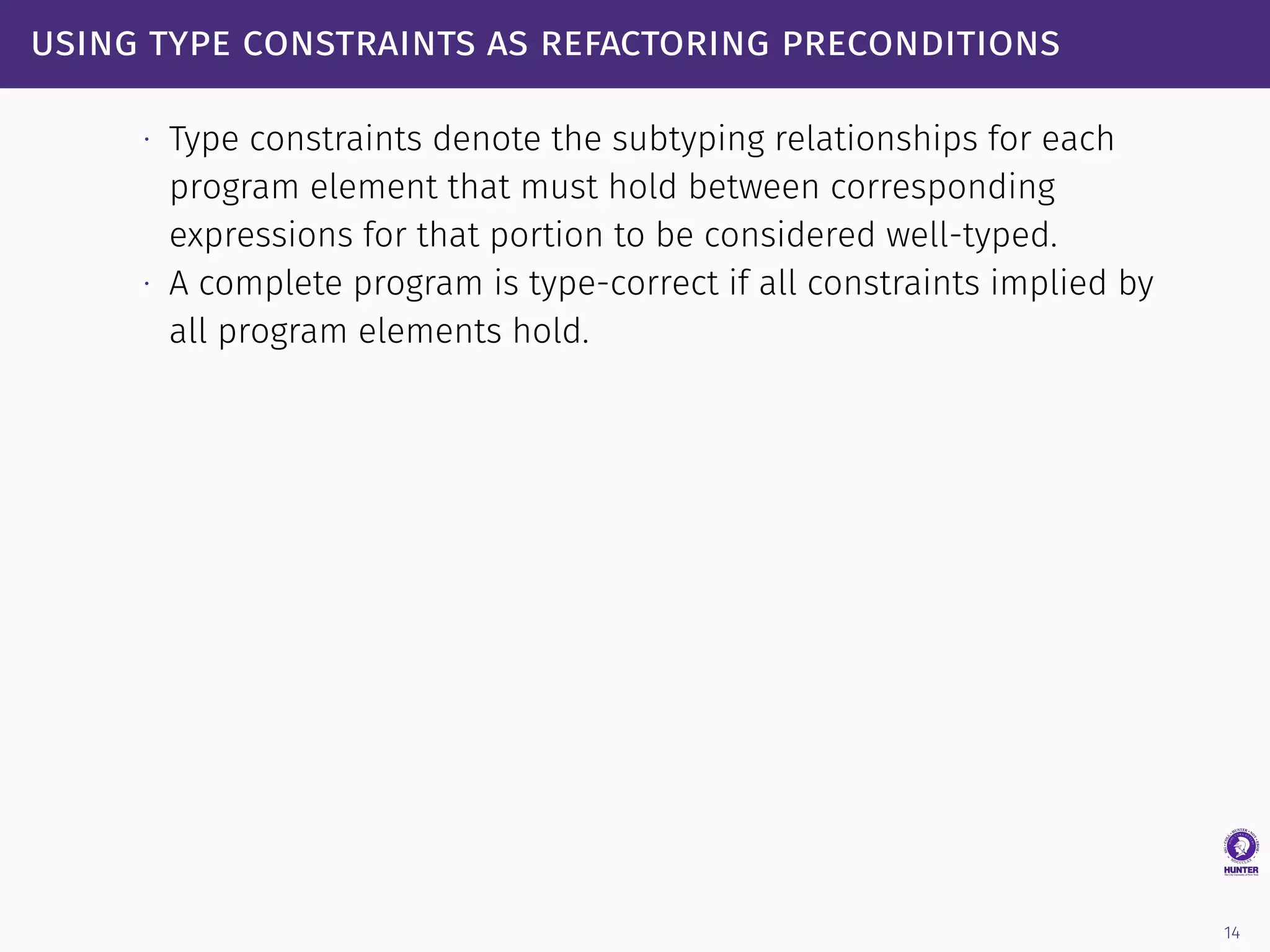
![using type constraints as refactoring preconditions ∙ Type constraints denote the subtyping relationships for each program element that must hold between corresponding expressions for that portion to be considered well-typed. ∙ A complete program is type-correct if all constraints implied by all program elements hold. program construct implied type constraint(s) access E.f to field F [E.f] ≜ [F] (1) [E] ≤ Decl(F) (2) 14](https://image.slidesharecdn.com/paper-170524211242/75/Automated-Refactoring-of-Legacy-Java-Software-to-Default-Methods-Talk-at-ICSE-2017-49-2048.jpg)
![using type constraints as refactoring preconditions ∙ Type constraints denote the subtyping relationships for each program element that must hold between corresponding expressions for that portion to be considered well-typed. ∙ A complete program is type-correct if all constraints implied by all program elements hold. program construct implied type constraint(s) access E.f to field F [E.f] ≜ [F] (1) [E] ≤ Decl(F) (2) Migrating size() to Collection would imply [this] = Collection. interface Collection<E> { default int size() {return this.size;}} 14](https://image.slidesharecdn.com/paper-170524211242/75/Automated-Refactoring-of-Legacy-Java-Software-to-Default-Methods-Talk-at-ICSE-2017-50-2048.jpg)
![using type constraints as refactoring preconditions ∙ Type constraints denote the subtyping relationships for each program element that must hold between corresponding expressions for that portion to be considered well-typed. ∙ A complete program is type-correct if all constraints implied by all program elements hold. program construct implied type constraint(s) access E.f to field F [E.f] ≜ [F] (1) [E] ≤ Decl(F) (2) Migrating size() to Collection would imply [this] = Collection. interface Collection<E> { default int size() {return this.size;}} This violates constraint (2) that [this] ≤ [AbsList]. abstract class AbsList<E> implements Collection<E> { @Override public int size() {return this.size;}} 14](https://image.slidesharecdn.com/paper-170524211242/75/Automated-Refactoring-of-Legacy-Java-Software-to-Default-Methods-Talk-at-ICSE-2017-51-2048.jpg)
![new type constraints, definitions, and semantics preservation ∙ Extend [Tip et al., 2011] with new constraints, new definitions, and semantics preservation for default methods. ∙ See paper for more details. 15](https://image.slidesharecdn.com/paper-170524211242/75/Automated-Refactoring-of-Legacy-Java-Software-to-Default-Methods-Talk-at-ICSE-2017-52-2048.jpg)
